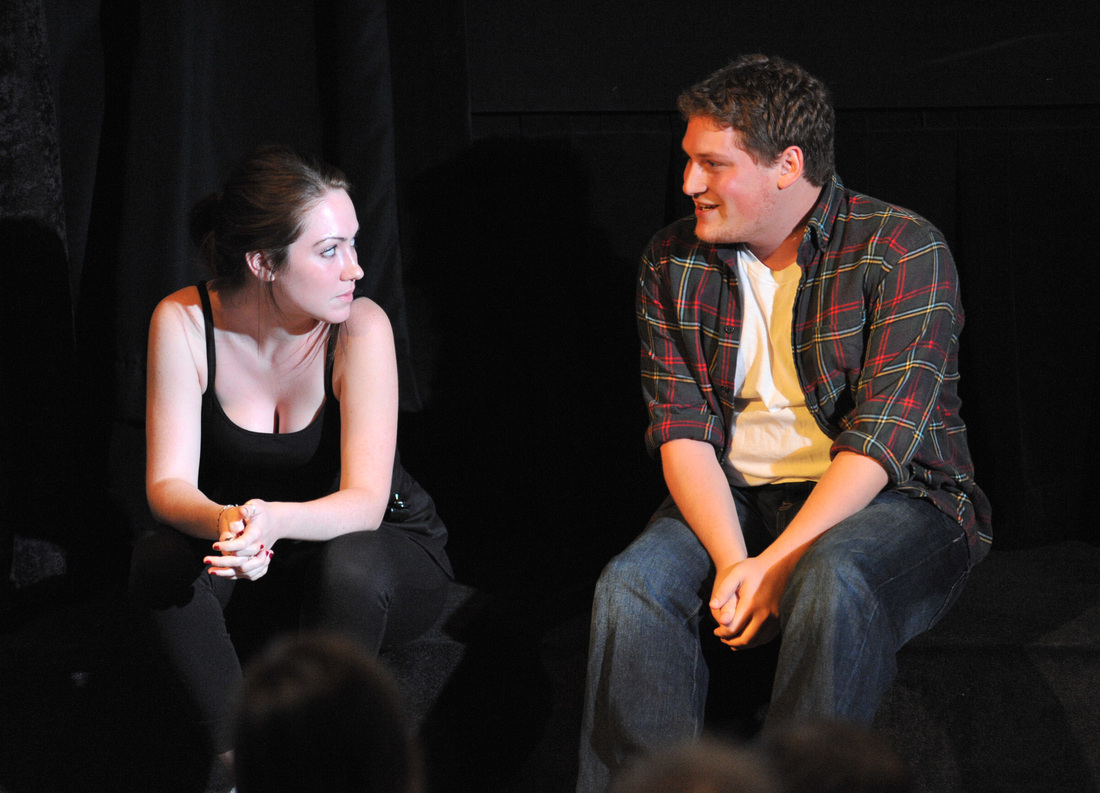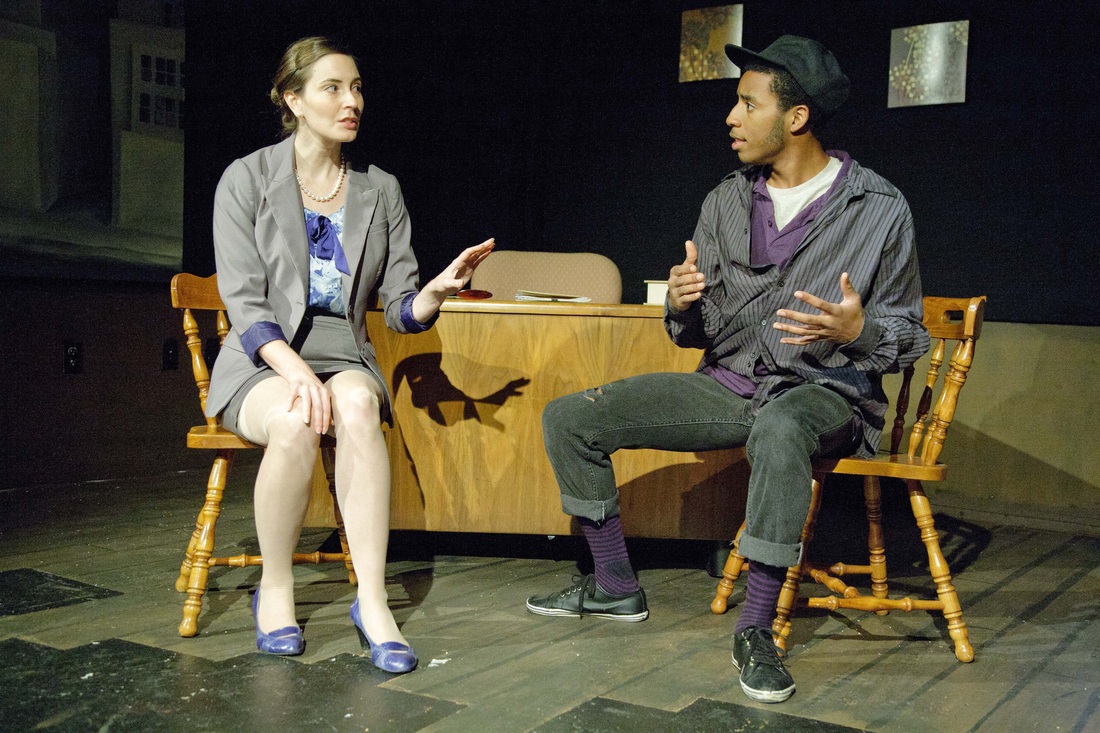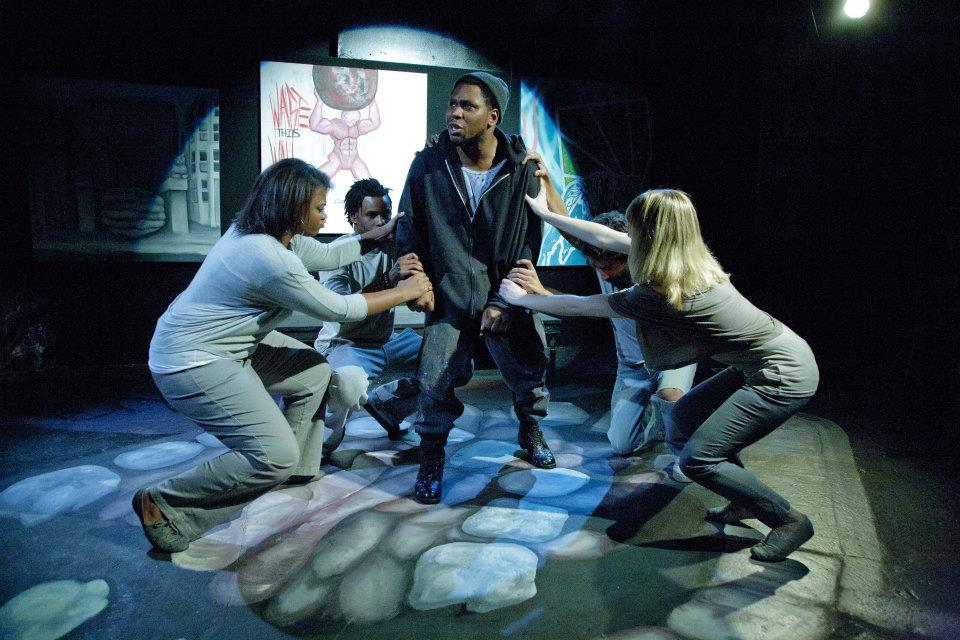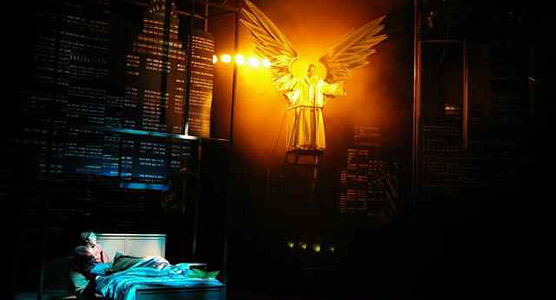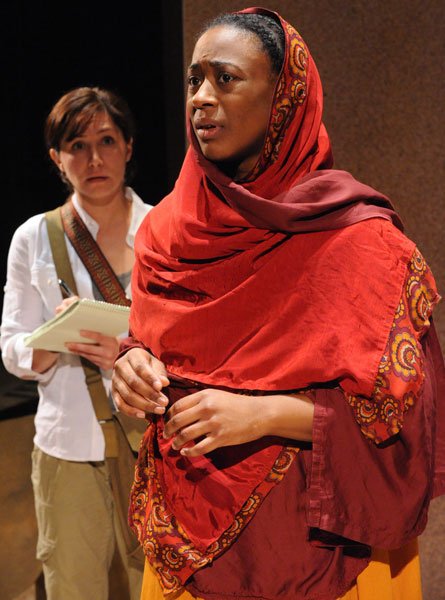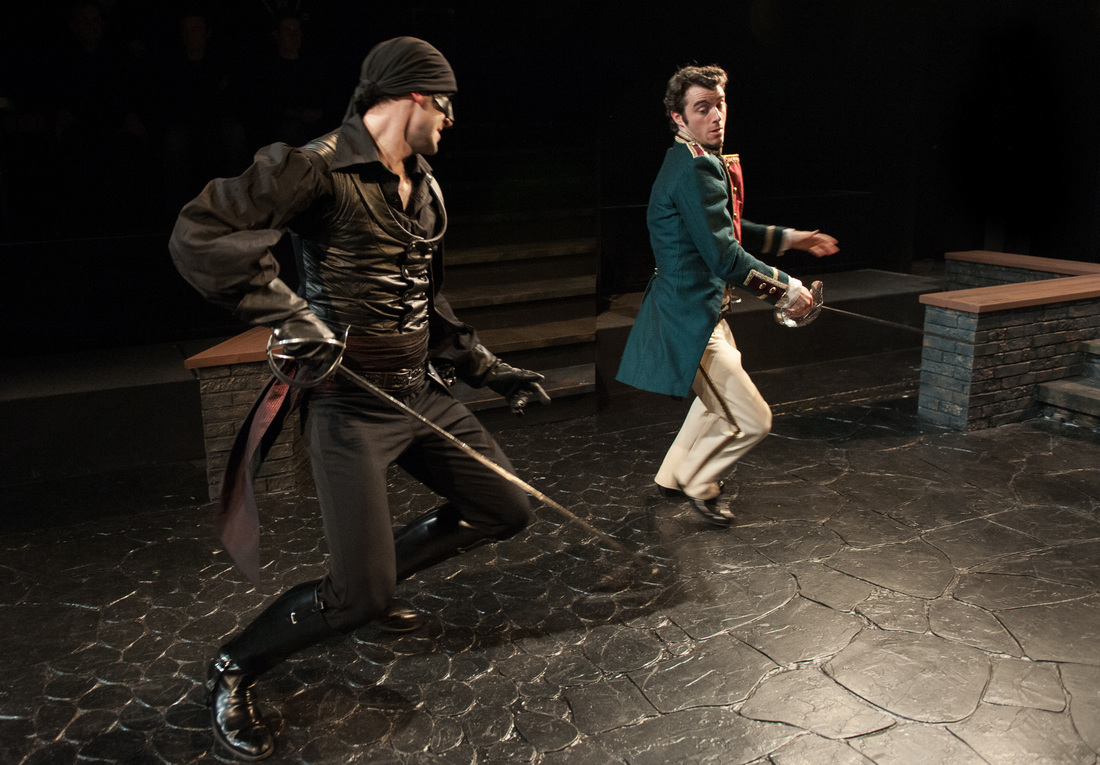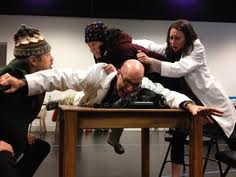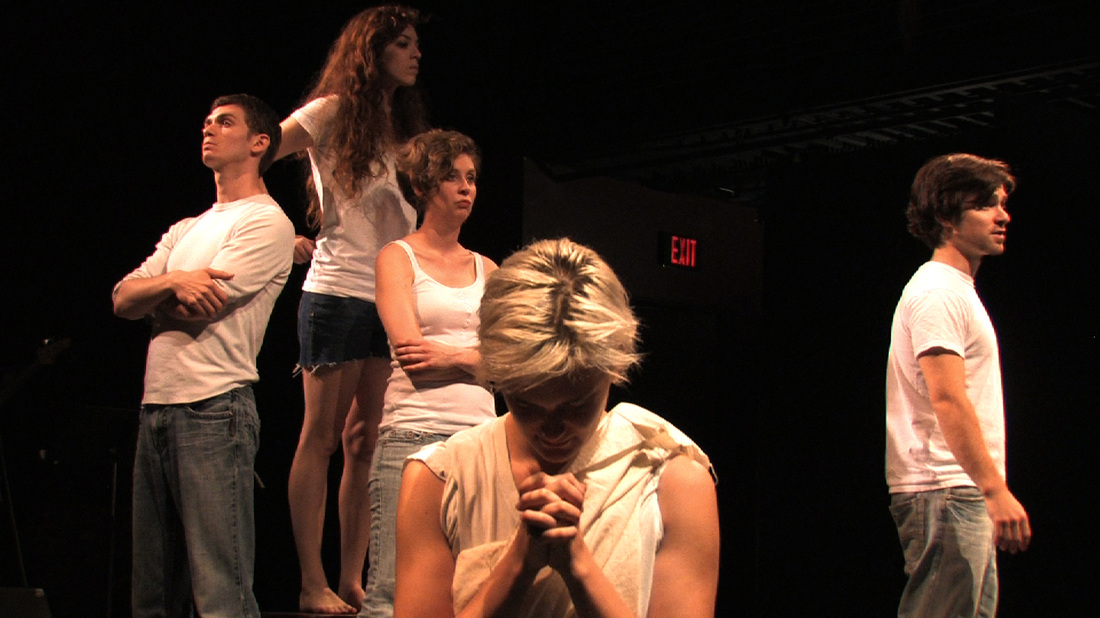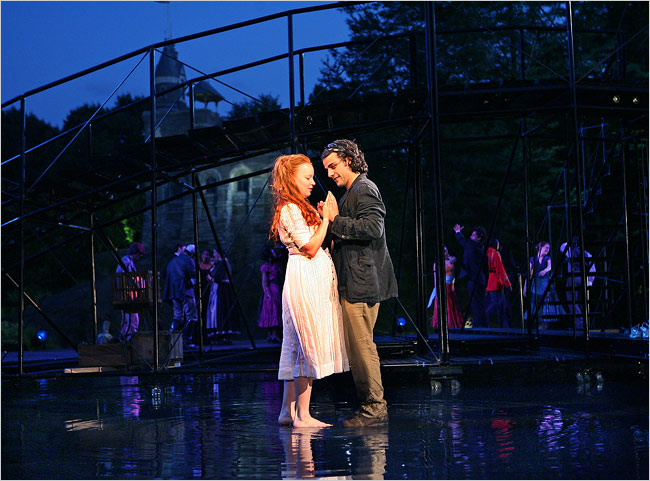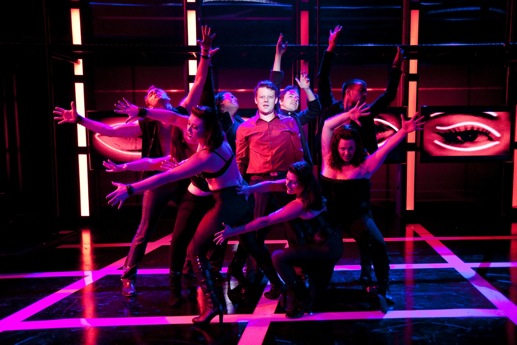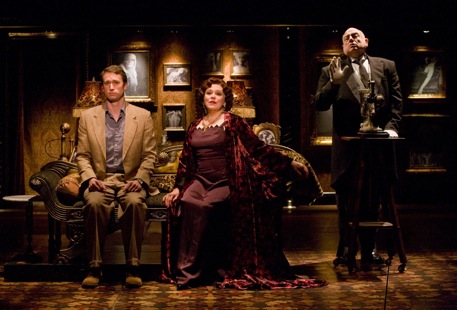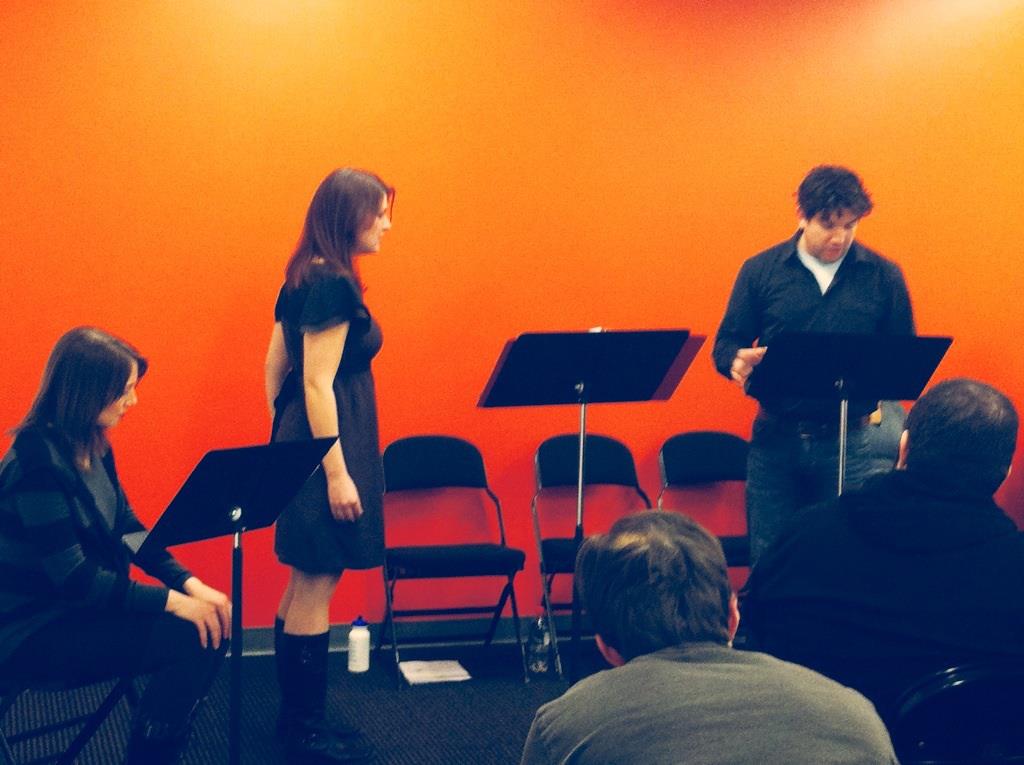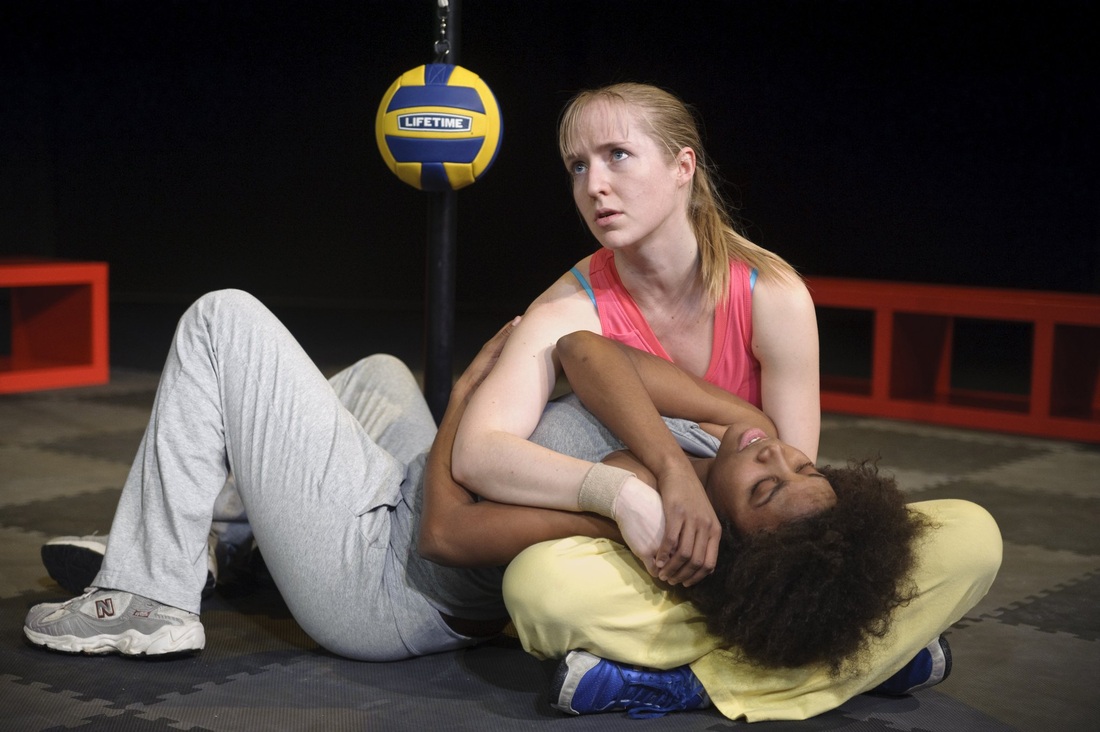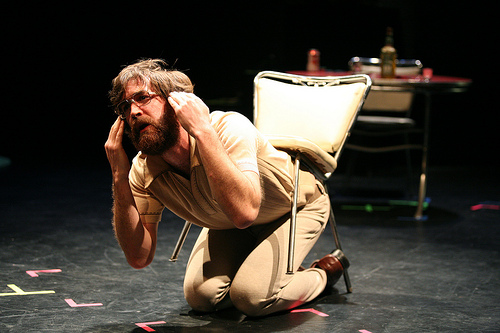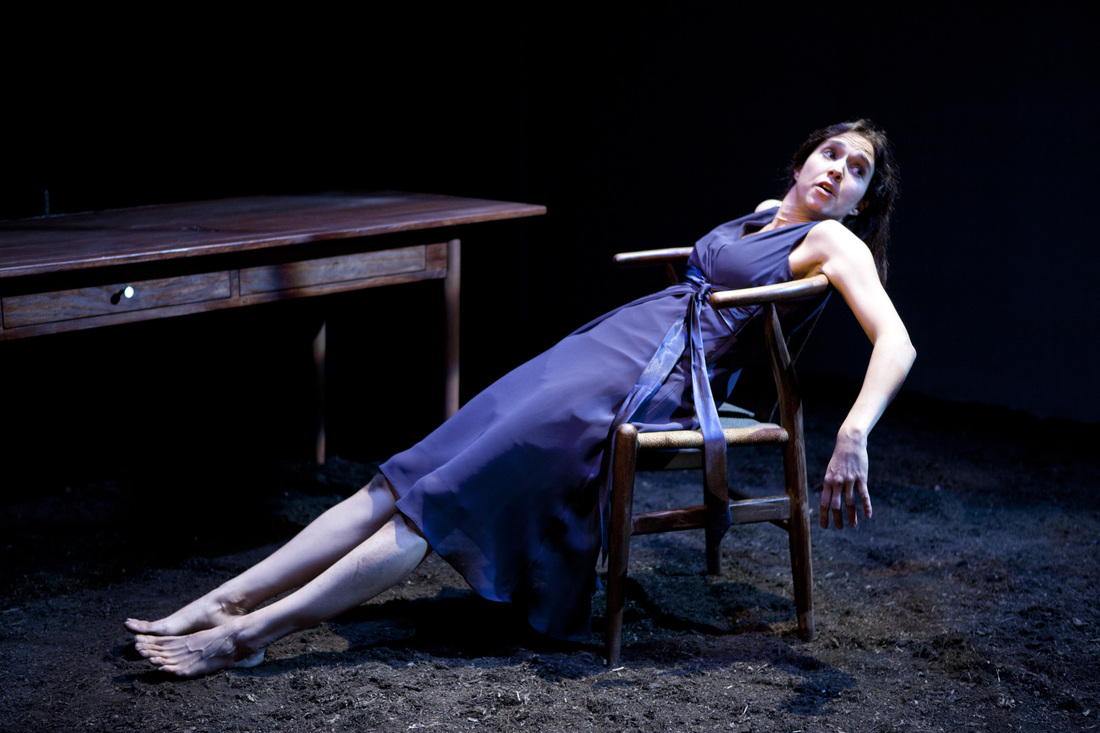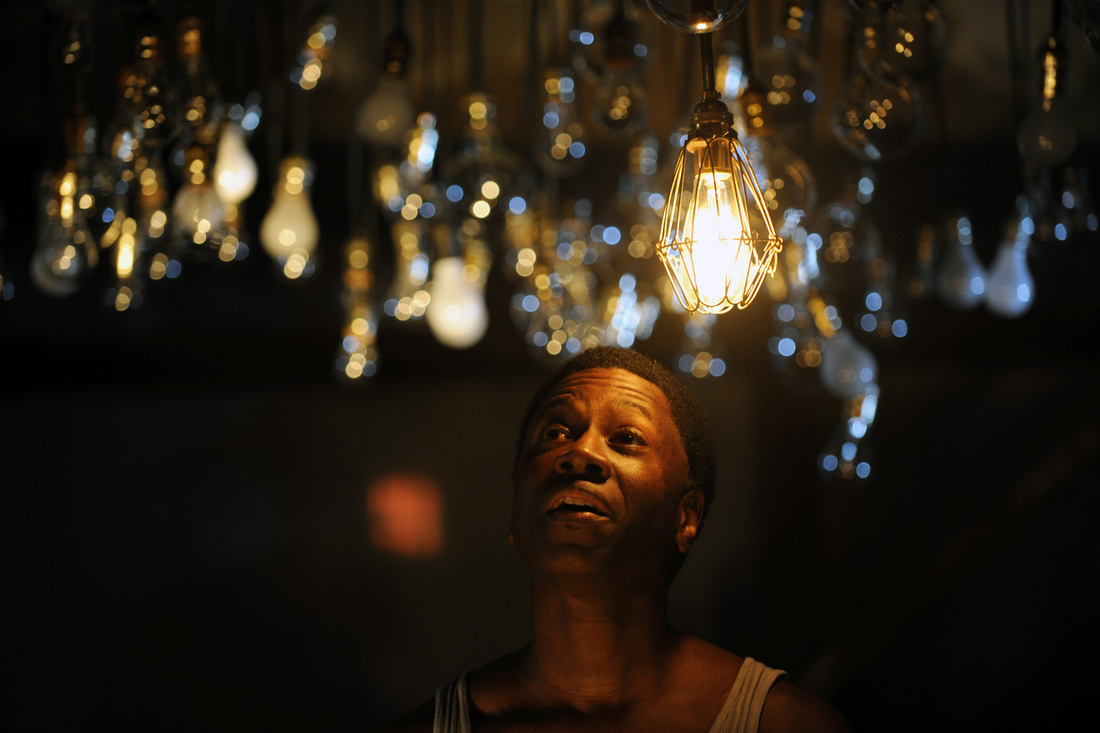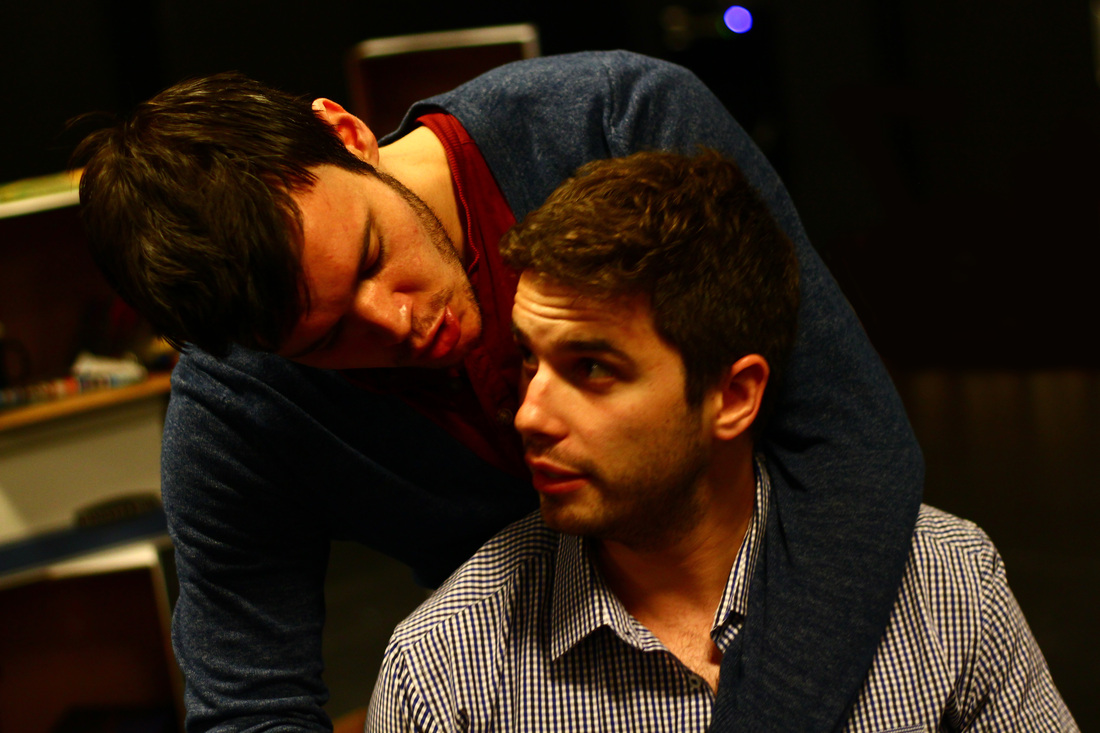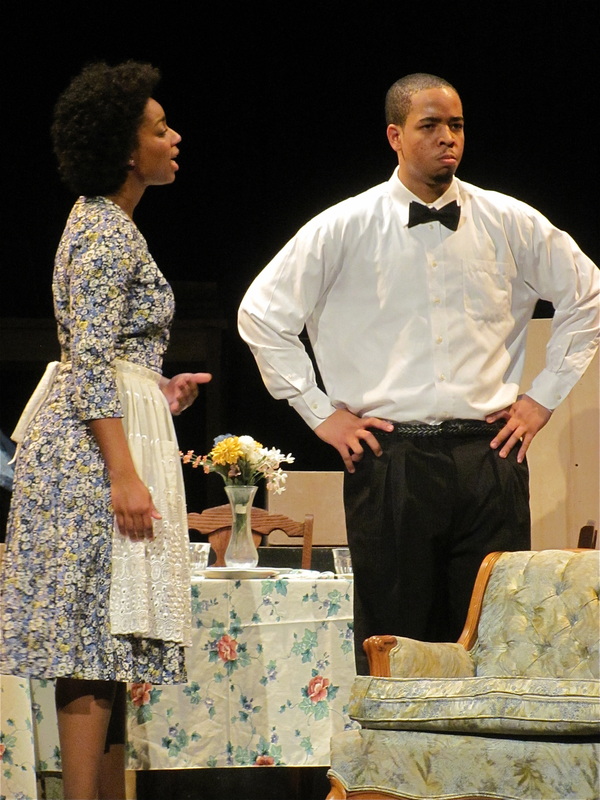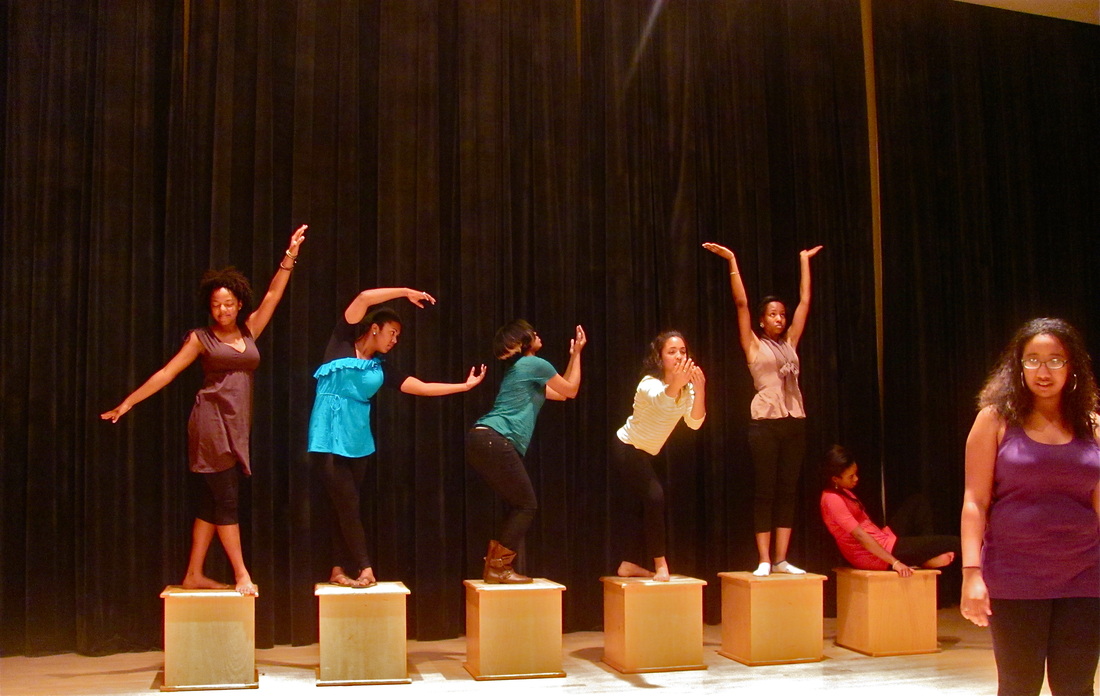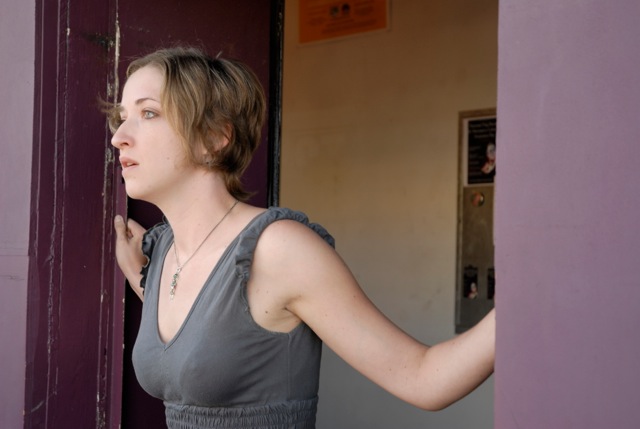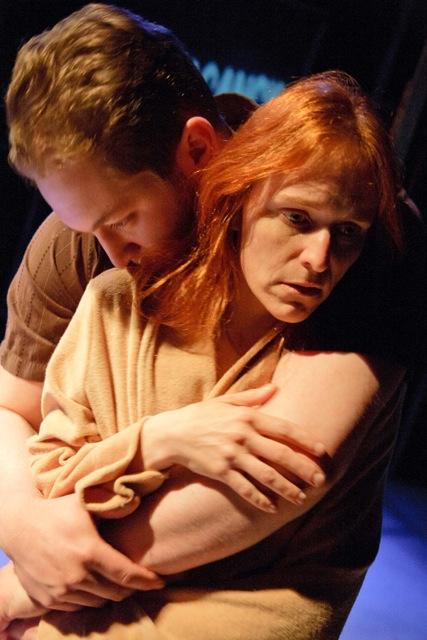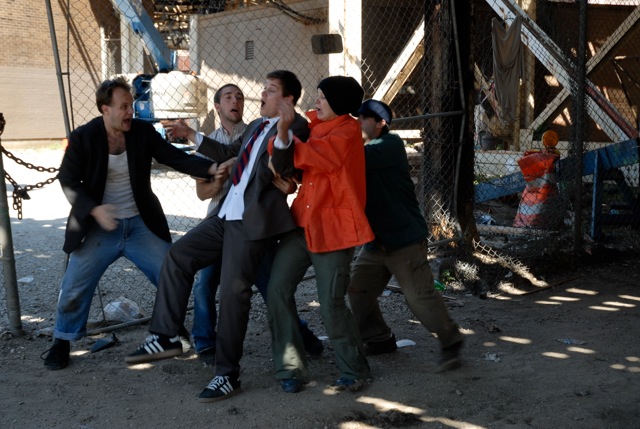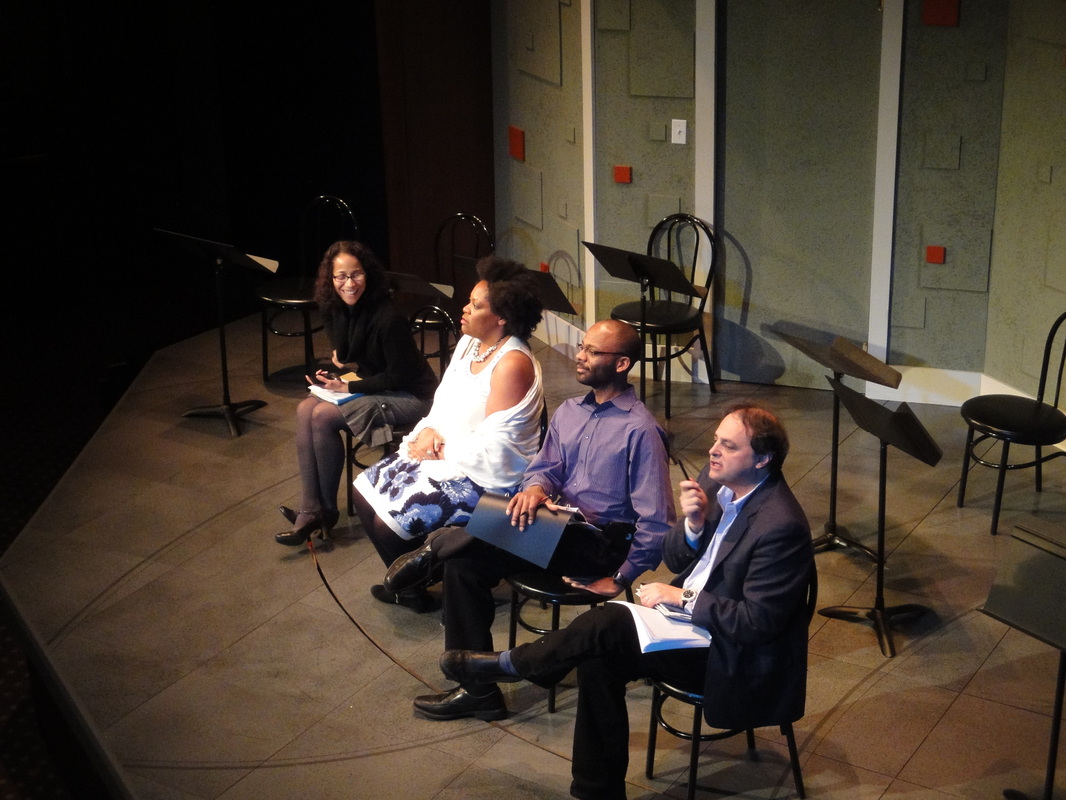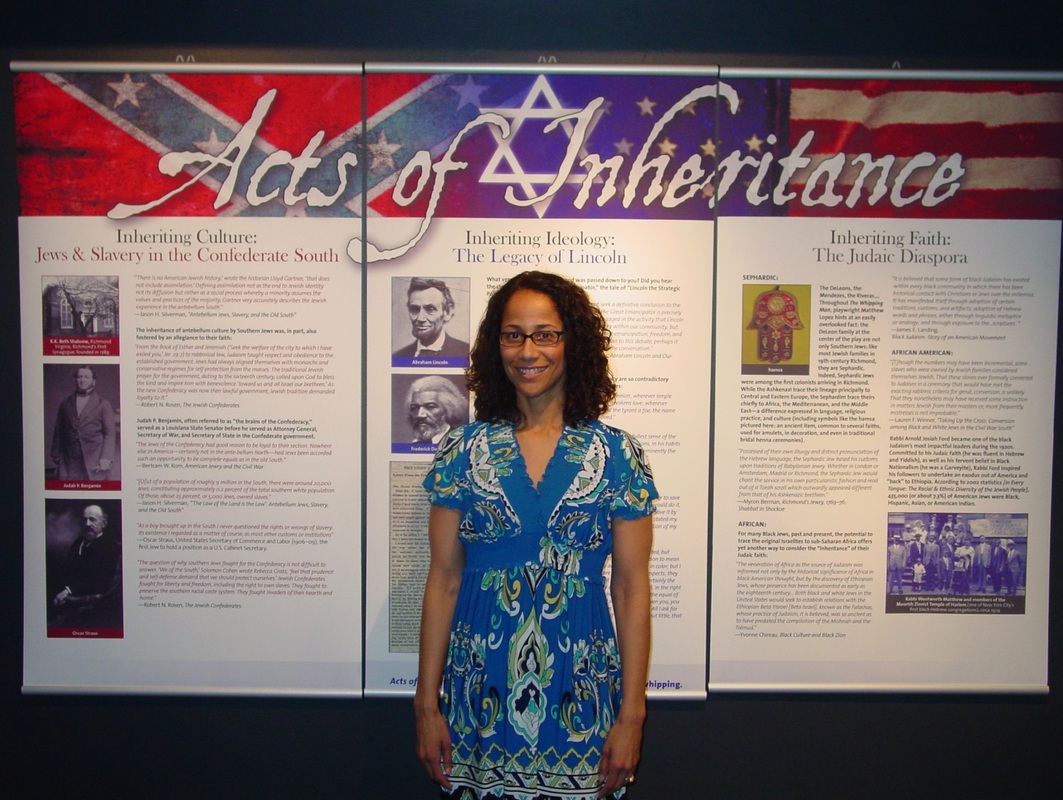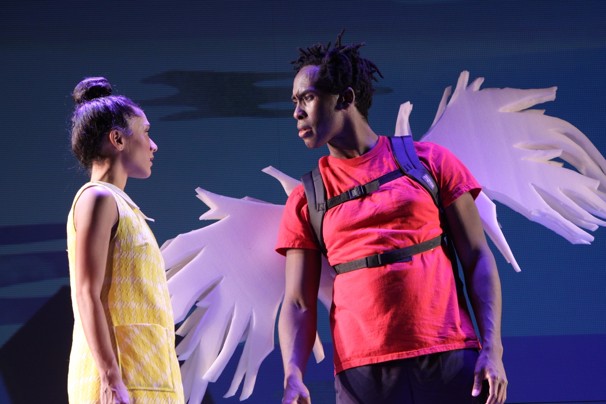|
Anu Yadav's MEENA'S DREAM opens tonight at Forum Theatre. In this beautiful solo performance, Anu is accompanied by three musicians who perform a live blend of South Indian classical music and American jazz. Anjna Swaminathan plays the violin, Rajna Swaminathan plays both the mrudangam (South Indian percussion) and piano, and Sam McCormally plays the guitar and piano. Click here to listen to music from the show. Last week, I had a chance to speak with Anjna about her work as a dramaturg and composer on the play. Please enjoy!  JACQUELINE LAWTON: Why did you decide to get into theatre? Was there someone or a particular show that inspired you? ANJNA SWAMINATHAN: I think I had always been theatrical as a child. I grew up in an artistic family, and was constantly surrounded by South Indian music and dance, both of which are grounded in narrative and emotional expression. My mother was a singer, dancer, and actor, so storytelling became a major part of our lives at home. I didn’t quite understand that it was my calling, however, until my senior year of high school when I started acting in the school musical. I immediately fell in love with the craft as an actor, and on a whim, decided to major in theatre at the University of Maryland. A few months in, I started to notice the epic lack of South Asians on stage and soon realized that if I were to act, there were too few compelling roles and too many stereotypical ones. It was at this point of existential confusion that I met two incredible women who encouraged me to reconsider the potential I had to be a theatre artist. The first was Anu Yadav, the playwright and performer of Meena’s Dream. She was the one who made me look at theatre not as something historical, but as a living, breathing, contemporary art form that has to grow and change. If I didn’t see relatable characters on stage, I could create them. It seems so simple now, but at the time it was mind-blowing. During my sophomore year, I started taking performance studies courses with Professor Faedra Chatard Carpenter, who soon became my mentor and introduced me to some of the deeper, sociological aspects of performance like critical race, gender, and queer theory, and later to the word “dramaturgy.” JL: How do you define dramaturgy? Or explain to people about the work that you do? AS: I don’t think there is really a way to define dramaturgy, because the duties of a dramaturg transform with each project. I am a very young dramaturg—I really only got introduced to the term a few years ago—so, I myself am still figuring it out. That’s sort of the beauty of it—each dramaturg is different and gets to decide what his/her dramaturgy is. I have been fortunate to work with playwrights, directors, and choreographers, who are also relatively unfamiliar with the term. It’s been a fascinating journey of using the creative process to define dramaturgy for the artists I collaborate with, and for myself. More recently, I’ve been describing a dramaturg as a sort of “two-faced therapist.” It’s a strange concept, but I think it really gets playwrights and choreographers to open up about the personal reasons why they feel compelled to create what they create. For the past year, I have been doing my own playwriting alongside my dramaturgical work, which is what forced me to look at theatre as an emotional, cathartic experience, rather than a structural or political one. Theatre is ultimately about the stories of humanity. I know I’m young to make any sweeping judgments about theatre artists, but I do think there is a tendency among those within the field to separate themselves from the inherent emotionality of theatre when observing or critiquing a play. I instead ask playwrights why they need to write what they are writing—not about what the audience needs to learn, but about what the artist needs to release. It’s a very emotional conversation for most, but it reveals so much about the artist’s voice, story, and imagination, and just like the status quo of a play changes from exposition to resolution, so does the artist’s emotional status quo. That’s the first face of the theatrical therapist. The other face is towards the audience. I try to put myself in the shoes of any audience member who could walk into a theatre. What would they feel, what assumptions do they walk in with, how can we change them and move them? I also ask myself what their political standings may be, as most of the work I am involved is tied to some larger social issue. This is where the emotional part becomes critical. It’s one thing to create a theatre piece that is a jargon and factoid-loaded political rant, but it is another thing to tell a simple story that just happens move someone towards social change. JL: How long have you lived and worked as a dramaturg in DC? What brought you here? Why have you stayed? AS: First, a disclaimer: I graduated from the University of Maryland less than a month ago, so I’m still figuring out this whole “living and working as a dramaturg in DC” thing! I grew up in a small suburb in Maryland, and was relatively sheltered from cities like Baltimore and DC. Most of my artistic work as a young musician was among artists in the Indian-American community in Maryland, so my interaction with the arts in DC is very recent. With theatre, however, the DC scene is so rich with diversity and experience. For a few months, I seriously considered moving to Minneapolis, MN after college—I’ve been working with a dance company there for four years and have always loved the theatre scene there. I decided to stay here because what DC has (that many other places lack) is community and a multi-cultural tapestry. There are so many people here with such widely and wildly different stories, that I would really miss it. I think part of it is also the audience. Theatre has always been a bit paradoxical in that no matter whose story is on stage, it is usually upper middle class white Americans that attend shows. A lot of theatres in DC are challenging that… Forum Theatre, where we are producing Meena’s Dream, just began a new initiative, Forum4All, whereby audience members pay whatever they can. The conversation between diverse artists and diverse audiences is so important for building social consciousness and that’s what I love about DC. I’m sure I’ll travel and work elsewhere in the future, but for now, I feel too rooted in DC to leave! JL: What skills and traits do you feel a successful dramaturg should have to support the development of a new play or a production? AS: Experience: I think to really offer insight into a new play or production, a dramaturg has to have had at least some experience being on the other side. I started writing my first play a year ago, but in the process I have become a much better listener. I use my own struggles with plot structure and character development to understand and help the playwright. Compassion: Theatre artists all around have a duty to understand the perspective of the protagonist, the antagonist, the chorus, etc. You really have to feel what every character feels. In the same way, the dramaturg has to connect to all perspectives – that of the playwright, that of the director, that of the cast, that of the audience, and that of the critics. Open-mindedness/Humility: It is easy to go into a project with a vision of what theatre is, but if you allow yourself to learn from each project, you and the playwright/director can grow together. Going into a project with a mission of proving a point will get you nowhere. (I say this from experience, so I guess it’s also important to accept mistakes.) 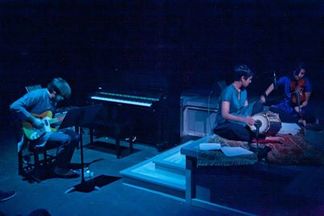 JL: In addition to serving as dramaturg, you also composed music. Can you tell me about your process? AS: This was the first project where I had to reconcile my musical identity with my theatrical identity, and I really thank Anu for giving me that opportunity. It had to happen at some point! I am trained in South Indian classical (Carnatic) violin, and have been working with several dancers and dance companies as a musician and composer for the past five or six years. There is a word that connects almost all Indian arts: rasa, which means emotion or expression. Carnatic music is composed of several ragas or melodic modes, each of which tells a different emotional story. This is what draws me to make music for dance and theatre – the emotionality. When we were in rehearsal for a workshop production of Meena’s Dream at UMD, director, Paige Hernandez, who had had previous experience with Indian dance, asked us to look for rasas instead of beats. That’s where I started to envision the process of composing for this play as a theatrical process. The style of the score comprises Carnatic music, contemporary jazz, and indie folk. The other two musicians are my sister, Rajna Swaminathan who switches between mrudangam (South Indian percussion) and piano, and Sam McCormally, who switches between guitar and piano. As the only purely Indian melodic voice, I see my violin’s role almost as another character in the play, with her own journey as she moves the plot along. JL: Why is music so integral to this story? AS: Anu has created an aesthetic world that travels between the real and the fantastical, and later, blurs the two. Just like lights and projection can turn a drab bedroom into a surreal dreamscape, the music is what carries young Meena into her own psyche. We’ve had so many discussions about what exactly the music represents—is it Meena’s emotions? Is it her imagination? Is it her mother’s voice? I think in a way, the music is all of these things and more. It doesn’t always go perfectly with Meena’s emotional journey, but complicates it. The music brings different tones and colors to the theatrical landscape that is so artfully described in the text. Does the play stand on its own? Definitely. But music resonates with audiences in a very visceral way, and we want them to feel the sorrow, the fear, the worry, and the inexplicable ecstasy, that Meena feels. JL: What excited you about working on Meena’s Dream? AS: In terms of my research interests, it was the fact that Anu was bringing together my two favorite things, spirituality and social change, and making an ancient spiritual text like the Bhagavad Gita extremely relevant to the external and internal battles we are all facing today. Two years ago, I saw a very early draft of the piece, which Anu performed as an assignment for her MFA program at UMD, and I immediately knew I wanted to do something for it. We had already discussed a musical score, but I wanted to be involved in the development of the script, and as I recall, it might have been me who asked if I could dramaturg it! In terms of my own growth as a dramaturg, this play sort of sandwiches my dramaturgical career. It was the first show that I started dramaturging and I am still dramaturging it! I also got to interact with other dramaturgs during the process and really observe and engage in the development of the play. My role began as a research dramaturg, and development dramaturgs Caleen Jennings and Patrick Crowley were also a major part of the process. On a personal level, at the time, I was going through my own journey of spiritual growth as I tried to cope with life and the loss of my own mother. That initial draft about a young girl facing her mother’s illness resonated with my own story so much, that I sort of needed to be part of it to grow as an artist and as a person. In a way, being involved in this project asked me to see how our own stories can help and heal others. JL: What do you hope audiences are thinking about after experiencing this play? AS: Hope. I want people to leave with an overwhelming sense of hope. There are so many plays geared towards social change that end on a sad note, almost as though we’ve given up on fighting for what we believe in. Meena’s Dream is far from bitter and the innocence of a child with a sparkle in her eye is far from naïve. We have so much positivity in us as children that slowly gets depleted as we grow up. My hope is that people will leave the theatre with a smile on their face, a sparkle in their eye, and the desire to dream again. JL: What’s next for you? Where can we follow your work? AS: It’s funny. I just graduated, and have yet to get bored of this question! I am continuing to work as a freelance composer/musician and dramaturg, but right now, I’m exploding with ideas and excited to find my niche as a playwright. Wherever the world takes me, I will always be some kind of artist, and I am looking forward to continuing to affect people with art. You can follow my work at www.anjnaswaminathan.com! 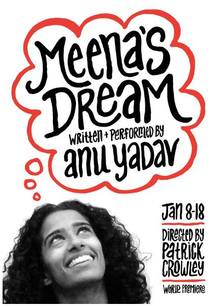 MEENA'S DREAM Written and performance by Anu Yadav Directed by Patrick Crowley Music by Anjna Swaminathan, Rajna Swaminathan, and Sam McCormally January 8-18, 2014 Click here for a full list of performance dates and here for ticketing information About the Play During the day, nine-year-old Meena wishes that her mother could get well; and by night, the Hindu God Lord Krishna appears, entreating Meena's help in his war against the Worry Machine. Meena's Dream creates a fantastical world through storytelling and live music, from South Indian classical to indie folk. 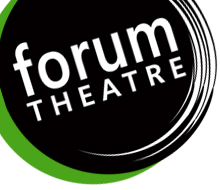 Forum Theatre produces adventurous, relevant, and challenging plays from a diversity of voices that inspire discussion and build community -- and that are accessible, affordable, and entertaining. Since Forum Theatre’s inception, we have aimed to be both the home for stories that provoke discussion and the place to host that discussion. We want our plays to be a conversation with the audience. We tell stories about who we are as a local, national, and global community. So what is a Forum show? That’s never been the easiest thing to describe, but a few things tend to always be true: A Forum show asks big questions. A Forum show is intricate and challenging, but has a big heart at its center. And a Forum show gives you something to think about and a lot to talk about.
0 Comments
JACQUELINE LAWTON: Why did you decide to get into theatre? Was there someone or a particular show that inspired you?
MEGHAN LONG: My first theatrical experience was my stage debut in grade school (2nd or 3rd grade, I think) as one of the aunt’s in James and the Giant Peach. I was a ham as a kid and loved performing on stage. My love of the stage spotlight continued through college and it wasn’t until I assumed the role of Executive Producer of a student theatre group my senior year at GWU that I realized there was a business to theatre. The story of my current producing and dramaturgical life is how it often happens: it was a decision not to work at a museum curatorial internship that landed me at Studio Theatre the summer after my junior year in college; that internship led to an internship with Jeffrey Herrmann, the managing director at Woolly; which, in turn led to a job at Round House, where I met Jessica Burgess and was introduced to new play development and dramaturgy with Inkwell. I consider Jeff, at Woolly, to be a mentor and a big influence on why I chose to pursue management and producing; equally as important, Jessica Burgess (and the entire Inkwell team!) has been my biggest influence for sparking my love of new plays and continuing to grow in the new play process. I have a laundry list of plays that excite and inspire me, but I find that it’s individuals I’ve met along my way that have inspired and challenged me to do the work that I do. JL: How do you define dramaturgy? Or explain to people the work that you do? ML: I relate the role of the new play dramaturg to that of a therapist. I listen, respond, and ask a lot of questions. Usually when I mention I’m a dramaturg I get a response along the lines of, “a drama-what?” I just say it a little slower making sure to pronounce each syllable: a dra-ma-turg. I think most people think it’s a theatre word I made up, but isn’t it a great word? And, it’s an even better role to play in the development process of a new play. JL: How long have you lived and worked as a dramaturg in DC? What brought you here? Why have you stayed? ML: I lived in DC for eight years and worked as a DC-based dramaturg for about four years. Initially, I moved to DC to attend The George Washington University for undergrad and stayed because I love the city. I was very fortunate to intern at both Studio Theatre and Woolly Mammoth Theatre Company during college and then after graduation worked at Round House Theatre right up until I moved to New York this past summer. I made the move to New York to pursue my MFA in Theatre Management and Producing at Columbia University’s School of the Arts. I still consider myself part of the DC-theatre community in spirit and try to visit as often as possible. (And, I’ll be back with a new project in the summer so it will be like I never left!) The DC theatre community is extremely welcoming and open and it’s this supportive network and community that allows for the creation of new and exciting work. JL: If your work as a dramaturg doesn’t pay the bills, what else do you do? How do you balance this work with your dramaturgy? ML: I was very fortunate that during my time in DC my “day job” was a job in theatre. I worked for four years at Round House Theatre: two years as the artistic administrator and two as the development assistant. For me, the biggest challenge was balancing my job at Round House, dramaturgical work with Inkwell, and producing with Junesong. I’ve always been the type to have multiple projects going on at once and I’ve learned my strengths and weaknesses when it comes to taking on new projects. I also eventually learned it was okay to say no to a project; I don’t have to do everything right now! The great part of my balancing act was that many of my projects overlapped and I could wear my administrator hat in relation to my dramaturgy work and my dramaturg hat with respect to my producing work. JL: What skills and traits do you feel a successful dramaturg should have to support the development of a new play or a production? ML: Patience, active listening, being generally curious helps too. In new play development it’s all about the playwright and the work she has created; it’s important to figure out what the playwright needs, wants, and those things that the playwright doesn’t know she wants yet. I think you need to be an advocate for the playwright; sometimes a reassuring presence in the room, and at other times the playwright bodyguard. I always make sure the playwright knows that she shouldn’t have to answer anything that she doesn’t want to yet. And, full disclosure - I don’t have any formal training as a new play dramaturg; I learned everything from listening to others during the process in the room. I credit everything I know to being a successful dramaturg to Anne McCaw; she was – and still is – instrumental in my growth as a dramaturg. Thanks, Anne! JL: What is the greatest part of being a dramaturg? What has been your most difficult challenge? ML: Being a collaborator is the best part of a being a dramaturg. I love the rehearsal room. There isn’t much that is better than listening to words jump off the pages. Inkwell describes their Showcase Readings (20-minute excerpts of plays) as first dates and that is exactly how I feel with each new project. It’s scary and can be challenging, but ultimately rewarding. And hopefully everyone walks away really wanting that second date. My most difficult challenge was finding my voice in the process when I first started as a dramaturg. It can be a delicate position to be in, to not only advocate for the playwright but also advocate for the important role that a dramaturg can play in the development of a new work. You have to know why you’re in the room and how you’re contributing to the conversation and development. JL: Who are your favorite playwrights? What is it about their work that inspires or draws you to them? ML: I’m never one for picking favorites, so I’ll go with all of the playwrights I’ve worked with through Inkwell. Inkwell-y playwrights write plays with big hearts, broad imaginations, and they all take huge risks. Language that is unique and just a little off – in a way that you can’t quite put your finger on it – really excites me, too. JL: DC audiences are … ML: Intelligent and engaged. JL: DC actors, designers and directors are .. ML: All artists whom I admire. JL: DC playwrights are … ML: The BEST! I’m biased, but they really are. DC playwrights are innovative, curious, funny, political, and some of my best friends. JL: DC critics are … ML: Engaged in the conversation. JL: How do you feel the DC theatre community has addressed the issues of race and gender parity? How has this particular issue impacted you and your ability to get your work produced on the main stages? ML: The issues of race and gender parity are topics of national theatrical conversation and not unique to DC. I, along with other women in the theatre, would love to see more female playwrights represented on Broadway and in our not-for-profit institutions across the country. Wouldn’t it be great if in five years female playwrights wrote half of the plays on our stages across the country? I love to go back to statistics on this point, too: think about who are buying the tickets to theatre? Who is the one planning the girls night out and, more than occasionally, dragging her husband to the theatre? Women!! I don’t see this changing any time soon, either. So, if our theatregoers are mostly women, where are we represented on stage and in board rooms? I think there should be more women running our nations best and biggest theatrical institutions. As a young theatre professional, I aspire to produce on Broadway or run a large institutional theatre and I hope that by the time I see myself in such a position that the lens of gender parity will have shifted or will become obsolete. It’s 2013, why are we still having this conversation? Here’s a well-deserved shout-out to you, Jackie, for being a champion for women in DC theatre! JL: What advice do you have for an up and coming DC based dramaturg who has just moved to D.C.? ML: Stay curious and keep learning. Read as many plays as you can get your hands on. Reach out to those in the DC theatre community and have coffee and listen their stories. Go to readings, workshops, and see as much theater as you can. DC is a city with a rich history and wealth of arts and culture – take advantage of everything else in the city, too. I always remind myself that – even though we sometimes don’t like to admit it – there is a world outside of the theatre. JL: What's next for you? Where can we keep up with your work? ML: Although I’m based in New York, I’m continuing my work with Inkwell from afar. I’ll be working with Inkwell through the current open call for submissions. I am also producing a new project with Tim Guillot this summer in the DC Fringe Festival. Tim is adapting Mike Daisey’s The Agony and the Ecstasy of Steve Jobs into a musical that we are producing, under the auspices of Junesong, at the Capital Fringe Festival. We’re both really excited to premier the work in DC this summer! Stay tuned to @junesongarts for more info. JACQUELINE LAWTON: Why did you decide to get into theatre? Was there someone or a particular show that inspired you?
TAYLOR LEE HITAFFER: I suppose my story is pretty standard... I come from an artistic family, so I learned from an early age the importance of creativity and self-expression. I sang, I danced, and I painted. But it was theatre that I enjoyed the most and would consistently go back to. When I was little, I used to go through my collection of Halloween costumes and write comedy sketches with my friends. When drama clubs became available through school I joined those, and then I went on to study theatre in college. Over the years my relationship with theatre has been majorly redefined. But in a lot of ways I still feel like I’m a big kid goofing off! Like, someday I’ll grow up and get a real job! I just have a really hard time visualizing myself doing anything else. JL: How do you define dramaturgy? Or explain to people the work that you do? TLH: Dramaturgy is fundamentally expansive. It is a process that must involve an analytical mind, a generous heart and a questioning spirit. A strong sense of humor is good to have, too! But when you get down to the nuts-and-bolts of how a dramaturg fits inside of the rehearsal room, you will find them sitting next to the director and the playwright, reflecting on the work being created and asking probing questions. A dramaturg's job is to safeguard the play and the vision of the playwright. JL: How long have you lived and worked as a dramaturgy in DC? What brought you here? Why have you stayed? TLH: I've been working in DC since 2008, although my family has lived in and around DC for generations. I'm very proud of this city and how openly it supports enrichment through arts and culture. I'm thankful that, when I'm in need of inspiration, there are plenty of free museums to get lost in. This is home for me. And when I die, I'll probably have my ashes scattered on the steps of the Library of Congress. JL: If your work as a dramaturg doesn’t pay the bills, what else do you do? How do you balance this work with your dramaturgy? TLH: I'm the program assistant for the Kennedy Center American College Theater Festival, where for the past four seasons I've coordinated the KCACTF National Festival and the Summer Playwriting Intensives, including the MFA Playwrights' Workshop and the New Play Dramaturgy Intensive. I am fortunate that what I do for a living merges so perfectly with what I do as a dramaturg. I have met so many gifted, intelligent, wonderful people. People whose opinions I value and respect. Knowing and talking with them has helped me grow as an artist. Their confidence in me gave me courage to have confidence in myself. JL: What skills and traits do you feel a successful dramaturg should have to support the development of a new play or a production? TLH: A love for creation, an enthusiasm for collaboration, and the ability to let go of ego and do your work from a place of total sincerity. JL: What is the greatest part of being a dramaturg? What has been your most difficult challenge? TLH: I have always loved stories, and for me, being a dramaturg allows me to live inside of stories. I get to go down the rabbit hole, sail to new worlds, and excavate lost artifacts. It's a joy to do what I do. I suppose the biggest challenge is finding someone who will let me do it! JL: Who are your favorite playwrights? What is it about their work that inspires or draws you to them? TLH: Tony Kushner's ANGELS IN AMERICA will always have a special place in my heart, namely because it was the first show I ever dramaturged, and because it set the bar for the mythical, highly-theatrical shows I often find myself gravitating towards. I love playwrights like Eric Overmyer and Jez Butterworth and Mary Zimmerman... playwrights who challenge us to re-examine the world around us, and dare us to restore the magic inside of ourselves. JL: DC audiences are... TLH: Hungry. Ready. Up to the task. JL: DC actors, designers and directors are.. TLH: Devoted. Profound. Fearless. JL: DC playwrights are … TLH: Passionate. Courageous. Utterly invaluable. JL: DC critics are... TLH: Instrumental. An important part of the conversation. JL: What advice do you have for an up and coming DC based dramaturg who has just moved to D.C.? TLH: "Be bold and mighty forces will come to your aid." JL: What's next for you? Where can we keep up with your work? TLH: I will be serving as an Advising Reader for The Inkwell's plays-in-progress open call, which I am so very excited about! And in May I will be dramaturging one of four plays as part of The Inkwell's First Contact Series. You can check out my website at www.taylorleedramaturgy.org, or follow me on Twitter @TaylorLeeTurgy. JACQUELINE LAWTON: Why did you decide to get into theatre? Was there someone or a particular show that inspired you?
LAURA ESTI MILLER: I've always equally loved books and art of all sorts - music, dance, visual art, puppetry. As soon as I could read, I devoured anything and everything in print. My sister and I devised elaborate roller-skating musicals in our basement long before we knew about Starlight Express or Xanadu. Endlessly listening to an early cast album of Les Miserables (on scratched vinyl) and questioning my mom about her experience of watching it in the theatre exploded my six-year-old imagination. I think that was when I started trying to figure out how to physically recreate all of the stories I knew at that point, and I kept on gathering more art, more stories, and more songs so that I could figure out characters' personal histories, making them leap out of books, off of walls, and through the record player. JL: How do you define dramaturgy? Or explain to people the work that you do? LM: When meeting new people, "dramaturgy" is often one of the first four syllable words to come up in conversation. Many dramaturgs I know cultivate a quick cocktail party answer in addition to a longer explanation of what it is that dramaturgs do. My cocktail party answer changes according to what aspect of the work I'm focused on at the time and what projects are on the horizon. Sometimes I say that I work with playwrights to develop new work, other times I talk more about research and education. My longer explanation often involves calling what I do "theatre anthropology." Dramaturgs are theatrical anthropologists. We uncover the roots and origins of the piece, discover how it behaves, what variations and differences make it unique, and analyze how structure impacts its outcome. It can be a challenge to narrow what a dramaturg does into a soundbite because the job changes due to the particular demands of the play, project, theatre, or organization. JL: How long have you lived and worked as a dramaturg in DC? What brought you here? Why have you stayed? LM: I grew up in the DC area. I returned after college to work in educational theatre and had my first taste of professional dramaturgy. I dramaturged plays and projects in college, but I didn't realize that that's what I was doing. After a few years of guessing and taking wild swings at dramaturgy (many thanks go to Forum Theatre's Michael Dove and Paul Frydrychowski for allowing me so much room to fail and grow in those years!), I knew I wanted and needed formal training. I applied to grad school, moved to New York for a few years to study, train, and gain as much experience as I could. After school, a few internships, and some extraordinary jobs, I moved back to the DC area in the fall of 2010 in order to be near both my ancestral and artistic homes. Since returning, I have been welcomed back to Forum, and have also been honored to be part of both The Inkwell and Pinky Swear Productions. JL: If your work as a dramaturg doesn’t pay the bills, what else do you do? How do you balance this work with your dramaturgy? LM: In addition to freelance dramaturgy, I teach. I am a professor and teaching artist. I do keep strange hours. No two weeks look exactly alike! JL: What skills and traits do you feel a successful dramaturg should have to support the development of a new play or a production? LM: I find that it is helpful to listen, to ask questions (hopefully the right questions!), and to make sure that you are working towards developing the piece that the playwright or group of artists wants to create, not just the one that YOU want to create. JL: What is the greatest part of being a dramaturg? What has been your most difficult challenge? LM: I have a few greatest parts:
A challenge of being a dramaturg is that it is not a consistently defined role. While that can be exciting, in that I can apply skills in so many different areas, it is also not always a given that a dramaturg could or should be involved in script or production development. The challenge becomes working with a team that just might not know how to best work with a dramaturg, or occasionally, might resent working with a dramaturg (this has not happened to me too often, just to clarify, but I get questions about it because of how the role has been dramatized on TV of late). JL: Who are your favorite playwrights? What is it about their work that inspires or draws you to them? LM: I have many! This is not a definitive list by any means, and I'm not sure if there is just one thing that unites these writers, but I find that I'm often drawn to playwrights who are confronting deep fears or pain, who do something a little surprising with darkness. Julia Cho, Mia Chung, Ross Harris, Henrik Ibsen, Callie Kimball, Tony Kushner, Martin McDonagh, Lynn Nottage, David Robinson, Melissa Ross, Stephen Spotswood, Joe Waechter, Anne Washburn, Lauren Yee. Also, I always find something new and fascinating in Shakespeare. JL: DC audiences are ... LM: Bright. Honest. JL: DC actors, designers and directors are .. LM: Incredibly talented and dedicated JL: DC playwrights are … LM: A mighty force! Unstoppable. JL: DC critics are ... LM: Willing to connect and support the artists in our city JL: How do you feel the DC theatre community has addressed the issues of race and gender parity? How has this particular issue impacted you and your ability to get your work produced on the main stages? LM: There is much to do in this area. That is such an understatement that it's laughable. We, as a theatre community, as an arts-interested society, must support and highlight more diverse talent. Personally, I am blessed to have a great deal of support from Pinky Swear Productions - whose mission is to showcase female talent whenever possible - and The Inkwell - also female-helmed and committed to featuring wonderful local talent (I must credit Lee Liebeskind with great feats of casting in every reading! He does a marvelous job) - and Forum, where we are making strides to demonstrate gender equity in our work, as well. I know we need to go further to address both gender and racial parity on our stages and in our artistic teams. Those conversations are happening, which is a start. JL: What advice do you have for an up and coming DC based dramaturg who has just moved to DC? LM: Go see productions. Offer to read plays for theatre companies. Reach out to dramaturgs and grab coffee/drinks with them. Become friends with playwrights, directors, designers. Continue to read everything. Get involved in things that are not solely theatre-related. Believe in yourself. JL: What's next for you? Where can we keep up with your work? LM: I'm going to be reading lots of new, exciting plays for multiple companies:
JACQUELINE LAWTON: Why did you decide to get into theatre? Was there someone or a particular show that inspired you?
ANN-MARIE DITTMANN: I knew I wanted to do something theater related from an early age. In elementary school our next-door neighbor was involved in the University Theater scene and her daughters and my brothers and I ended up appearing in the children’s roles for several University productions, and I stayed involved in theater and dance through high school. As an undergrad I thought that I wanted to be a Stage Manager and possibly a Director. I started out in the Stage Management program at Boston University. But then Freshman year I took my first Theater History class and I knew immediately that Theater History would need to play a strong role in whatever I did in the theater, the next semester I discovered Dramaturgy and I felt like I had truly found my calling, so I switched to the Theater Studies program, which allowed me to peruse Dramaturgy. My first professional job was at Goodspeed Musical. That was a wonderful experience, because I was able to see what went into producing both revivals and new work, and I fell in love with developing new plays. JL: How do you define dramaturgy? Or explain to people the work that you do? AMD: I often tell people Dramaturgs are artistic shape-shifters, because they have the skill sets to adjust to fill and support many important artistic roles in the theater. I usually start out by explaining to people that in the traditional sense dramaturgs are the people who conduct the background research to help the director and actors examine and understand the context of the play, and often write the program notes to provide the audience with context for the play. But in contemporary theater a dramaturg also helps playwrights develop and clarify their scripts. Often in an institutional setting they help set or shape a theatrical season, and provide audience enrichment programs related to the productions. In terms of new play development the dramaturg is sort of the midwife for the play, the one who helps things along, the outside eyes and ears that help keep things on track and support the playwright so she or he can produce a vibrant compelling script. JL: How long have you lived and worked as a dramaturg in DC? What brought you here? Why have you stayed? AMD: I’ve worked off and on as a dramaturg in DC for eleven years. I came here with my husband when he wanted to move here for a great job opportunity. We have stayed for a variety of personal and professional reasons, but it certainly helps that DC is a great area for theater. JL: If your work as a dramaturg doesn’t pay the bills, what else do you do? How do you balance this work with your dramaturgy? AMD: For the past six years I have been a Library Associate at the Arlington Public Library. One of the primary functions of my position is producing Public Programming for adults. I have been very fortunate to be able to incorporate theater related audience enrichment and presenting new theater work as part of my work in that position. Before the budget cuts in the last few years we had a much more robust calendar of programming. I was able to present a number of solo theater works by writer/performers such as Laura Zam, Psalmayene24, and Kathleen Gonzales. We also had a reading of Elsewhere in Elsinore by Caleen Jennings performed by her students from American University and a reading of Chay Yew’s Questions 27, Question 28 by MuseFire productions. I’ve had some great theater related round table discussions including one on Sanskrit Drama, at the time when WSC Avant Bard was doing a series of readings of Sanskrit plays, and a panel on Shakespeare in Contemporary Art and Media. I’ve also been fortunate to have a continuing Meet-the-Artist series that focuses on theater artists. The past couple of years I have been focusing on Arlington based theaters, but in previous years it has included theater artists from all over the DC area. I also appreciate the opportunity to get out in the field and freelance on shows. For the past two years I haven’t done much freelance dramaturgy, just moderated a few post-show discussions here and there, primarily because I have been serving as a Judge for the Helen Hayes Awards. I have to admit that the commitment to judging for HHA has taken up a great deal of my time for theater. Although, I do try to squeeze in seeing as much new work as possible outside of my Helen Hayes duties. I think it is very important for a dramaturg who is interested in new work to get out and see as many readings, workshops and productions as possible to keep abreast of what is going on. Plus, a lot of area playwrights are friends and I want to support them and their work. JL: What skills and traits do you feel a successful dramaturg should have to support the development of a new play or a production? AMD: A love of research and storytelling are key, being an active listener and the ability to articulate one’s perceptions about the play are all important traits and skills for dramaturgs. For new plays in particular it is very important to listen to a playwright and their ideas and then discern if their vision is being communicated on stage. A good feel for Socratic method is important. You need to be able to articulate what you are seeing and hearing and then ask questions or give insight that will help the playwright see what they have so far so that they can decide how and where they want to take the play from there. For works that are already part of the canon it depends on the focus of the production, is the director trying to re-envision it and take it in a new direction, if so is she or he still being true to the text? With an established text I feel that in many ways the dramaturg supports the text and advocates for the playwright, either in helping to clarify or illuminate the context of the play or by insuring that the author’s intent is honored. I feel that one of the most important roles of a dramaturg to be an advocate for the playwright and helps to make sure their vision is achieved on the stage. That support of the playwright and their vision applies just as strongly when the writer is in the room, out of town, or has been dead for hundreds of years. JL: What is the greatest part of being a dramaturg? What has been your most difficult challenge? AMD: The greatest part of being a dramaturg is the opportunity to collaborate with so many different talented artists to produce plays in an area that truly values theater. I especially like watching a new play take shape over time and then launch into the larger theater world. I also thrive on the opportunity to talk with audiences about what they have seen on stage, or help to provide them with additional insights into the work on stage; those informal teaching and learning moments are fantastic. For me at the moment the biggest challenge is finding time to practice dramaturgy in an active way, right now I feel very much like I’m just squeezing it in where I can. It’s great, but I’d like to be able to spend more time on it. JL: Who are your favorite playwrights? What is it about their work that inspires or draws you to them? AMD: Favorite playwrights, wow, there are so many playwrights in DC whose work I admire. I’ve been a big fan of both Karen Zacarais and Heather McDonald since being introduced to their work while I was at Arena Stage. More recently I’ve been following Ally Currin, Bob Bartlett, Paige Hernandez, Jacqueline E. Lawton,, Psalmeyen24, Richard Byrne, I could go on and on. DC has so many amazing and talented playwrights with strong original voices. Some of the current writers on the national scene I’ve been following include Joe Calarco, George Brant, Jason Grote, Lisa D’Amour, and Caridad Svich. On the musical front, locally I think Matt Connor is very talented and on the national level I really like Adam Gwon and Jeff Bowen’s work. The writers who intrigue me the most tend to look at a variety of different topics and ideas, most of all they tell interesting stories through compelling characters. Each writer might do that very differently in each play, I’m not as attracted to a particular voice as I am a creative way of presenting a unique perspective about intriguing ideas or subjects through nuanced characters. It is the same reaction I have to a play by Shaw or Brecht or Stoppard. JL: DC audiences are ... AMD: DC audiences are, sophisticated, dedicated, adventurous, and intelligent. JL: DC actors, designers and directors are .. AMD: DC actor, designers and directors are deeply talented, dedicated, resourceful, daring, and innovative. JL: DC playwrights are … AMD: DC playwrights are talented, diverse, passionate, complex, insightful, inventive, original and resilient. JL: DC critics are ... AMD: DC critics are perceptive, human, operating from a deep respect for and understanding of theater making an honest effort to assess what they see. Having served as a Helen Hayes Judge I have developed a deeper respect for the position critics are in. I really do think that they do a very good job over all. Not that critics and Helen Hayes Judges are filling analogous roles, quite the contrary. But there are some similarities. Theater producers are often not happy with what critics have to say about their shows, they are sometimes not happy about how things come out in the Helen Hayes Awards, but I think by and large both groups are doing a good job and are conscientious about their assessments. The artistic level of theater in DC is extremely high and often undertaken with a fair amount of artistic risk that usually pays off and I think that both critics and Helen Hayes Judges appreciate what goes into creating that work. It’s an incredible gift to be able to see so many fantastic and diverse plays in this region. JL: How do you feel the DC theatre community has addressed the issues of race and gender parity? How has this particular issue impacted you and your ability to get your work produced on the main stages? AMD: I think that in many cases the DC theater community is beginning to embrace more diversity of all kinds on stage. I feel that as the number of smaller theaters doing very high quality and often challenging work has increased it has helped to challenge all of the theaters in the area to embrace greater diversity, both in their casting and the breadth of plays they produce. As a dramaturg that shift has certainly begun to opened more doors and create greater opportunities for female and culturally diverse playwrights and provides a much more varied and interesting array of plays being produced. Even with the strides that are being made I think we have a way to go before we as a theater community reach real parity in what is produced. JL: What advice do you have for an up and coming DC based dramaturg who has just moved to D.C.? AMD: My advice to an up and coming DC based dramaturg is to identify a small or medium sized company or two and build a relationship with them. Get to know the writers and directors and actors in town, new work emerges in some of the most unexpected places. Be willing to volunteer your time with a company doing things that aren’t necessarily simply related to dramaturgy. Once you start to build genuine relationships you will begin to find more opportunities to practice your passion. Also, don’t expect to pay the bills strictly as a dramaturg these days, or at least not always. One has to decide for themselves how to balance the art and the pay, dramaturgs often teach either theater or other subjects at the high school or university level. Of course the world of the adjunct has changed a lot in the past decade too. Fortunately, the skill sets of dramturgs translate into a lot of other jobs, especially in the not-for-profit world, unfortunately it can take a lot of trial and error to find the right balance. And if you really are driven to try to make your living exclusively through dramaturgy you are going to have to be willing to relocate fairly often, depending on what your other expectations are for your life that may or may not be realistic, especially as the role of the dramaturg in professional theater has been shifting in the past decade. JL: What's next for you? Where can we keep up with your work? AMD: My major focus right now is my day job of library programs and my volunteer work with the Helen Hayes Awards. The next Down Stage meet-the-artists program at the library will be on Monday, May 13 at 7 pm with Tom Prewitt, the new Artistic Director of WSC Avant Bard. The program is free and open to the public, so please join us. It will take place in the auditorium of the Central Library in Arlington located at 1015 N. Quincy Street, Arlington, VA 22201. The final meet-the-artist program for this season will be on Monday, June 13 at 7 PM, also at the central library, but I’m still confirming that guest. Then we will begin that series again in September. You can follow library programs at www.arlingtonva.us/library to see the events calendar. JACQUELINE LAWTON: Why did you decide to get into theatre? Was there someone or a particular show that inspired you?
JENN BOOK HASELSWERDT: If I had to pinpoint a particular show, it would—embarrassingly—have to be Annie. I saw an amateur production when I was five years old or so, and I remember thinking, “Well, shoot. If they can do that, I can do that!” I was very fortunate to have had a series of encouraging adults throughout my youth, beginning with my parents of course, then Mrs. Blum, my second grade teacher, who let me stay in during recess to write scripts on her typewriter; Mrs. Powell, my fourth grade teacher, who always let me read the fiction I’d written out loud to the class (and gave me constructive criticism); Ms. Schmidt, my middle-school drama club teacher, who helped me explore Gore Vidal and the psyche of the Wicked Witch of the West; my high school teachers, Mr. Shovlin and Mr. Vogelman, who took everything I knew about theatre and turned it on its head, forcing and encouraging me to examine what made theatre theatre. JL: How do you define dramaturgy? Or explain to people the work that you do? JBH: My husband lives in another professional world (political science), and one of his colleagues put it pretty succinctly: “Oh, so you’re a script consultant?” In this political and legal environment, people understand what a consultant does—everyone’s a consultant in DC, right—so a lot of the time, I go with that. I think that dramaturgical work is different for every process. Most of what I do is new play development, so I read scripts, talk with playwrights about the questions they’d like to answer through an exploratory process, and help them find answers to those questions. In production dramaturgy, I’ve done research into the world of the play, in order to help the actors and directors understand time period, conflicts, etc. I think that at its core, dramaturgy is about helping the other artists present the best version of the playwright’s vision. (And that’s what’s important: the playwright’s vision.) JL: How long have you lived and worked as a dramaturg in DC? What brought you here? Why have you stayed? JBH: I moved to DC in 1997 to get my degree in theatre at American University. I thought I wanted to be an actor, but really reveled into the research I found essential to creating believable characters. (When I played Nurse Ratched in One Flew Over the Cuckoo’s Nest, I got a time-period-appropriate version of the psychology Diagnostic and Statistical Manual, and diagnosed each of the characters for myself. Not because I was assigned to, just because I wanted to.) And I loved getting actor packets. Devoured them. When I was about 23, in the same week, my roommate told us she was moving out to take the literary management internship at GEVA, and a friend of mine got the role as the daughter in Mamma Mia on Broadway. I was jealous of the budding dramaturg, and congratulated the actress. And then I had to take a step back and examine that gut reaction: maybe what I really wanted to do was dramaturgy! So, I went to get my degree in dramaturgy at CUA, and I’ve been doing it ever since. I’ve stayed in DC for a few reasons: first, because my family is here. And secondly, I find that the DC area has some of the most amazingly creative collaborators I could have hoped to find. The community is so nurturing. JL: If your work as a dramaturg doesn’t pay the bills, what else do you do? How do you balance this work with your dramaturgy? JBH: My full-time job is also in theatre: I’m the Education Program Manager at Imagination Stage. In addition to a lot of administrative work that helps the education department run smoothly, I also get to teach three to six Creative Drama classes a week, in addition to work in arts integration. It’s a great way to help stretch my creative muscles. I also get to bring my son to classes, which is a fantastic perk! My professional life is education during the day, dramaturgy at night. JL: What skills and traits do you feel a successful dramaturg should have to support the development of a new play or a production? JBH: I think that at their core, dramaturgs need to have an inquisitive spirit. This carries through both new play development and research dramaturgy. You have to love the journey, and to accept that finding answers might lead you down a rabbit hole to more questions. JL: What is the greatest part of being a dramaturg? What has been your most difficult challenge? JBH: I get paid to read scripts and be a nerd and talk to people about those things! That is awesome! In retrospect, that’s been my dream my whole life. My most difficult challenge has been with playwrights who seem less interested in collaboration, and more interested in just hearing their words read aloud. I think there’s absolutely value in hearing actors read a script, but if you don’t want to be asked questions—and that’s my process, I don’t give statements unless specifically asked for them—then, you can probably just ask some friends to come over to your house and read. I put a lot of thought into the questions I ask, and how to direct a conversation around a table, and when the process is met with shrugs instead of exploration, it’s tough. JL: Who are your favorite playwrights? What is it about their work that inspires or draws you to them? JBH: Strangely enough, the first name that popped into my head was Stephen Sondheim. And he’s not a playwright! But his lyrics are so complex, his storytelling techniques so diverse, his rhyme schemes and rhythms so evocative. I’ve been reading his books Finishing the Hat and Look, I Made a Hat recently, and they’re filled with theatre history, criticism, and writing tips. It’s also very interesting to read about how he worked with his various collaborators, and what his revision process is. For proper playwrights, I’m continually intrigued by Maria Irene Fornes’s use of language and magical realism, Caryl Churchill’s variety of female voices, and Christopher Durang’s humor and absurdity. JL: DC audiences are ... JBH: Attentive consumers of theatre and information. They’re eager to read, watch, and talk. JL: DC actors, designers and directors are … JBH: Amazing collaborators with smart questions. I’m constantly astounded at the dramaturgical minds around the development table, regardless of what position folks were hired for. JL: DC playwrights are … JBH: Eager and conversant. I’m excited to be able to get in on the ground floor with submissions, and to talk with both emerging and established playwrights about their work. JL: DC critics are ... JBH: Increasingly easy to talk to and understand. The advent of social media has (for better or worse) forced people to talk to each other, rather than putting critics on a pedestal. I find Twitter conversations with folks like Peter Marks particularly interesting. JL: How do you feel the DC theatre community has addressed the issues of race and gender parity? How has this particular issue impacted you and your ability to get your work produced on the main stages? JBH: I think that the DC theatre community is becoming more and more aware of the race and gender biases that have been rampant in American theatre. It’s a dialogue that I’m thrilled has started, but that needs to trickle down (or up?) into more actual practice. I’m thrilled that The Inkwell—where I spend the majority of my dramaturgical time—has made a real effort to work with diverse playwrights, and plays where we can hire diverse actors both racially and along gender lines. Our most recent showcase featured the work of three female playwrights. JL: What advice do you have for an up and coming DC based dramaturg who has just moved to D.C.? JBH: See everything! One of the best things I did for myself was to become a Helen Hayes judge. What an awesome opportunity to see a wide and diverse amount of theatre. I was able to refine my aesthetic, but also to learn to put what I liked aside and talk about plays objectively. That’s a great skill to learn. Talk to everyone! At The Inkwell, we’re working with upcoming dramaturgs through our Shadow program, putting emerging artists in a room with established artists, to engage in a development process. Talk to us; we’d love to meet you! JL: What's next for you? Where can we keep up with your work? JBH: In March, I’ll be dramaturging The Inkwell’s InkReading of Steve Moulds’s The Body. I’m so excited about this reading—I had the opportunity to dramaturg a 20-minute showcase reading of the play two years ago, and it’s awesome to work with Steve again, and to dive into the full script. Later this year, I’ll be working with two pieces in Theatre J’s Locally Grown Festival, in addition to dramaturging the six one-acts in the DC Queer Theatre Festival. You can keep up with my work on my website: www.jbhdrama.com. JACQUELINE LAWTON: Why did you decide to get into theatre? Was there someone or a particular show that inspired you?
ADRIEN-ALICE L. HANSEL: I’ve always been a theatre person. I think I made the transition from actor-on-stage in elementary to high school to a script-as-literature/cultural object in college to oh-my-goodness-I-can-actually-work-on-productions post-college through internships and then grad school and then the professional world. So I was attracted to theatre because I liked being on stage, pretending to be someone else, being a part of something strange and silly and serious. I came back to it in college as something I actually wanted to study because it was one of most consistently engaging ways I found to study the sort of big picture/little picture world of people in society, in their cultural and historical moment. Also, there’s something so literal about theatre that I found appealing when I was considering the best way to work through a liberal arts education—it’s one thing to read about gender as it’s performed. It’s another (and for me, more evocative) thing to stage As You Like It or Peggy Shaw or the most fabulist contemporary writer. We’re wired to understand things about other people. Theatre let me do that. And as a professional…it’s just something I’ve gotten to keep doing. A lot of that has to do with two early mentors of mine: Michael Bigelow Dixon, whom I met during my six-week summer internship in the literary office of Actors Theatre of Louisville. I actually never never never thought I’d find a career in the theatre; it seemed far too capricious a workforce. But Michael asked me hard questions and expected me to know the answers and waited until I figured them out. He helped me realize I could do this work, and that I really liked the work. Christine Sumption was my supervisor at Seattle Repertory Theatre and likewise expected me to be smart and flexible and resilient. She’s also one of the best rounded theatre person I know (she has these things called ‘hobbies’ that I only read about in plays.) JL: How do you define dramaturgy? Or explain to people the work that you do? ALH: I always say that I’m an early audience member for the show, someone who can be exquisitely articulate about my experience, and articulate about the ways that the experience I have of a play differs from the way we as a production team are talking about that play. That I’m rooting for the play as the rest of the creative team envisions it—whether the playwright is involved or not—and that I help articulate whatever gaps between what I understand our goals to be and what I see on stage. JL: How long have you lived and worked as a dramaturg in DC? What brought you here? Why have you stayed? ALH: I’ve been in DC for just over two years—I’d been at Actors Theatre of Louisville for eight seasons, and moved because David Muse had just taken over Studio Theatre, and was interested in starting new play and international programs. I’ve stayed because we haven’t perfected that yet. And because it’s so wonderful to work in a city with a real ecosystem of theatres—differing in size and taste and style. JL: If your work as a dramaturg doesn’t pay the bills, what else do you do? How do you balance this work with your dramaturgy? ALH: I’m the Literary Director at Studio Theatre, so I have a staff position, which makes the bill-paying more centralized. I spend maybe 60% of my time at Studio as a straight-up production dramaturg. The rest of my work here is managerial and administrative—architecting the stream of plays we consider for season planning; working with my kick-ass Associate Lauren Halvorsen on script reading, public programming, and our writing around the season; working with the heads of Communication and Development on the many ways we talk about Studio’s work and its value to the community and the larger field. JL: What skills and traits do you feel a successful dramaturg should have to support the development of a new play or a production? ALH: Smarts, discretion, patience, a sense of satisfaction in being helpful rather than visible (or right), a great sense of humor, the ability to go with the flow and to read people. It’s never bad to have a couple recipes for great baked goods for that time in rehearsal when actors just need to figure things out for themselves. JL: What is the greatest part of being a dramaturg? What has been your most difficult challenge? ALH: I find a lot of great parts of being a dramaturg, and they’re not at all like each other:
JL: Who are your favorite playwrights? What is it about their work that inspires or draws you to them? ALH: So.Many.Writers. I love Rude Mechs for their silliness and sense of danger and delight. Kirk Lynn is their playwright, but they’re a hivemind of strangeness and true loveliness. There are a slew of fabulist Brits whom I just adore, writers who throw themselves into a world beyond our world and show me something unnerving and wonderful about life as we’re living it: Sam Holcroft, Bryony Lavery, Mike Bartlett, Caryl Churchill, Lucy Prebble. And the fabulist Americans, who can twist language and situation and history and hand me a new sense of myself and my country: Naomi Wallace, Suzan-Lori Parks, Lucas Hnath, Marcus Gardley, Mac Wellman, David Adjmi, Jordan Harrison, Anne Washburn, Kyle Schmidt, Heidi Schreck, Adrienne Kennedy, Marco Ramirez, Kirsten Greenidge. And the take-your-breath-away realists from both sides of the Atlantic, who can dissect relationships with impossible grace, who map out the intersections of our social and personal worlds said and unsaid: Amy Herzog, Rachel Bonds, Lydia Diamond, Mike Bartlett, Diana Grisanti, Duncan Macmillan, Marisa Wegrzyn, Nina Raine. There are some dead folks I love too! Euripides for a good dose of crazy, Shakespeare and Beckett for dizzying poetics, Tennessee Williams for an emotional workout. JL: DC audiences are … ALH: Smart, more adventurous than they suspect, and a little more sentimental than they’ll admit. JL: DC actors, designers and directors are... ALH: Creative, true team players, great dressers, and a whole lot of fun to work with. JL: DC playwrights are … ALH: Kind, thoughtful, and truly dedicated to making DC a welcoming place for their fellow writers. It’s inspiring. (They are also a whole lot of fun to hang out with. But that’s maybe true of the playwright community writ large.) JL: DC critics are ... ALH: Interested in excellence, idiosyncratic in their tastes (and thank goodness for all of us theatre-makers), and I think pretty fair-minded. JL: How do you feel the DC theatre community has addressed the issues of race and gender parity? How has this particular issue impacted you and your ability to get your work produced on the main stages? ALH: Well. We’ve far from adequately addressed it to be sure (Another local dramaturg/director, Elissa Goetschius, has dedicated herself to the project of accounting for the percentage of work that’s directed by women). As far as how parity has affected my own work, I’m glad I’m not the only person talking about race and gender (and country of origin, I’d add, since David’s given us a mandate for international work as well) in my institution. At Studio, we talk about parity from the beginning of most of the programming conversations: What is the range of experience we’ve succeeded in representing over the last number of years? What stories have we been producing? What have we left out? And what are we doing about it? These conversations have led us to shift some of our solicitation practices and to the first slate of commissions Studio just announced. That said, these aren’t conversations that feel close to resolved. And once you’ve programmed your season, there’s the designer/director/production staff who you want to make sure feels representative of the full talent pool of artists. JL: What advice do you have for an up and coming DC based dramaturg who has just moved to D.C.? ALH: There’s a lot of theatre here. You should go see it! Figure out who’s making work that you love, work that’s worth your time and heart to jump on into. And then offer to help. Seriously, just ask. Meet people, chat with people, ask people who they know. I don’t hire many dramaturgs—Studio isn’t set up that way—but I will nerd out about plays you love any time I have five minutes to rub together. And there are lots of small theatres who could love to use your brains and enthusiasms. I will say that if you haven’t worked in an institution before, this is a good town to get into a mid-sized theatre where you’ve got a chance of making your voice heard—there are a range of places with different aesthetics and budget sizes, of just-starting upstarts and long-term presences and provocateurs. There’s lots of new work and lots of classical work and lots of never-been-done-here work. People are making work in all kinds of ways here, and hitching your intern wagon to an established organization is one useful way to get a view of the work of institutional theatre and meet a lot of people. (Only if you love the mission of the theatre, and if you trust that the folks you’ll be apprenticing to are taking your personal artistic development seriously. But that’s the subject of a longer advice column.) And then, as anywhere, find your tribe. Make work. Trust your gut and go out on a limb and make interesting mistakes so you can make even more interesting mistakes. JL: What's next for you? Where can we keep up with your work? ALH: I’m not in rehearsal this summer, so I’m getting ready for our community outreach and audience engagement around the 13-14 Season, as well as catching up on all the flabbergasting work around town, seeing some plays out of town, reading plays, and finishing up season two of The Hour (I know, you all watched it last year. I was in rehearsal.) I’ll also be back at the Kennedy Center’s MFA workshop this summer, working with some young smarty-pants writer. And then this summer and fall I’m working Red Speedo by the ridiculously talented Lucas Hnath and director Lila Neugebauer (director of last season’s The Aliens at Studio). It’s a smart, stylish play about brothers and love and sacrifice and doping in sports and American exceptionalism. (Also there’s an actor who’ll be in a speedo for 90 minutes. If that’s your thing.) JACQUELINE LAWTON: Why did you decide to get into theatre? Was there someone or a particular show that inspired you?
JAMILA REDDY: I love telling this story, because it reaffirms my belief that no matter what happens, I’ll always end up exactly where I need to be. I tried out for the cheerleading team in eighth grade (to this day I have yet to do a split) and when I didn’t make it—to no one’s surprise but my own—my mom encouraged me to audition for the school play. I was mortified—I was supposed to be one of the cool cheerleading girls and she wanted me to hang out with the drama nerds?!—but got cast as the doctor in Wit by Margaret Edson and absolutely fell in love it. I’ve been a proud drama nerd since. JL: How do you define dramaturgy? Or explain to people the work that you do? JR: I like to think of myself as a dramaturg as a script defender. My job is to support the text by offering the actors and creative team resources that will help them live fully in the world of the play. I like the idea of a script defender because my job is to do whatever it takes to make sure that the story is getting told in a way that is truthful and clear to the audience. JL: How long have you lived and worked as a dramaturg in DC? What brought you here? Why have you stayed? JR: I came to DC to be the inaugural Artistic Apprentice at the Studio Theatre. I assistant directed the five season subscription shows and worked with Adrien-Alice Hansel and Lauren Halvorsen in the literary department, trying to soak up all of their dramaturgical brilliance. JL: If your work as a dramaturg doesn’t pay the bills, what else do you do? How do you balance this work with your dramaturgy? JR: I wish it did! I wear many hats; I work as an Assistant Resident Director in the Department of Housing and Dining at the American University, as a waitress in a lovely coffee shop/restaurant in Adams Morgan called Tryst, and as a coach for five brilliant young ladies on the Woodrow Wilson high school [spoken word poetry] Slam team. JL: What skills and traits do you feel a successful dramaturg should have to support the development of a new play or a production? JR: An eye for storytelling and genuine curiosity about the human condition. JL: What is the greatest part of being a dramaturg? What has been your most difficult challenge? JR: The greatest part of being a dramaturg is being in the room to witness how much the actors and director grow into and along with with the play. The most challenging thing is seeing or hearing my notes get diluted via misunderstanding or mistranslation from director to actors. JL: Who are your favorite playwrights? What is it about their work that inspires or draws you to them? JR: My favorite playwright right now is Young Jean Lee; I think her work is absolutely revolutionary. I’m inspired by how confrontational it is, not just for the sake of confrontation, but for the goal of shaking audiences out of their complacency with being mere observers. I love plays that make the audience a part of the dialogue, and her plays do that. I saw THE SHIPMENT a few years ago, and there was one moment in the middle of the play when the house lights came up and three of the actors stood on the lip of the stage and watched us watch them, in silence, for an entire minute. It took my breath away. I yearn to recreate that moment for my audiences when I direct; the feeling that you, as audience, are just as much a subject of conversation as the work being done on stage. JL: DC audiences are ... JR: Frustratingly white. JL: DC actors, designers and directors are .. JR: Delightfully young and local! JL: DC playwrights are … JR: Really hardworking. JL: DC critics are ... JR: See “DC audiences.” JL: How do you feel the DC theatre community has addressed the issues of race and gender parity? How has this particular issue impacted you and your ability to get your work produced on the main stages? JR: I can’t say that the community has done much to address it, but I can say that certain indivuals (like you!) and theaters (Woolly Mammoth) are taking great strides towards creating theatre (and a theatre community) that reflects the diversity and richness of the DC community. JL: What advice do you have for an up and coming DC based dramaturg who has just moved to D.C.? JR: There are so many opportunities to work with emerging artists, and what better place to network than DC? Meet playwrights, read their plays, talk about them, rinse, repeat. JL: What's next for you? Where can we keep up with your work? JR: Nothing on the dramaturgy front, but I’m currently working with a fabulous group of five young ladies, and will have the honor leading them in battle against other high school teams at the Louder Than a Bomb poetry slam competition in April. You can keep up with me at JamilaReddy.wordpress.com and on twitter: @JamilaReddy. JACQUELINE LAWTON: Why did you decide to get into theatre? Was there someone or a particular show that inspired you?
LARONIKA THOMAS: I was in college, at Indiana University, as a double major in Anthropology and Theatre. The plan had been to apply to graduate schools immediately after receiving my BA and to go on to get my PhD in Anthropology. But during my last semester I realized that if I made a list of all of the things I had done in college that I really enjoyed, it was heavily weighted with theatre. Also, I had heard of this crazy thing called dramaturgy, but I did not yet have any experience with it. I did know, in very basic and general terms, that it combined research with rehearsal responsibilities – and that definitely appealed to my nerdy personality. And then I was out in the “real world,” and had to figure out what to do next. I moved back to my hometown and started a theatre company, which led to my Masters in theatre and where I finally found my way to dramaturgy, which led to me moving to Chicago, interning at the Goodman and beginning my professional career as a dramaturg. I would not say there was one particular production that inspired me. I think it was more of an accumulation of experiences beginning from childhood, when I took dance lessons beginning at the age of 5, and then later when I played the villain (I got to die on stage – it was all very exciting to me) in a middle school classroom production of Billy Budd, through high school play productions where I had a very inspiring English and theatre teacher, and beyond. I do remember travelling to Chicago before I had graduated from IU and seeing a production at Steppenwolf – that was, I think, the first time I realized that theatre could actually be a viable profession. And I saw Too Much Light Makes the Baby Go Blind at the Neo-Futurists and remember thinking that *that* was the kind of theatre I wanted to make (and did make a few years later when I dramaturged several shows with them). JL: How do you define dramaturgy? Or explain to people the work that you do? LT: I am going to have to borrow from several other dramaturgs for my definition. Dramaturgs listen and question. We listen to and question the play, the playwright, the director, the artistic director, the actors, the designers, the mission of the theatre, the theatre, and the world – both as we know it and as we would like it to be. Robert Brustein called us the “humanist in the woodpile,” and I have always thought that had a nice ring to it. We research and contextualize the world of the play, work closely with playwrights and directors, serve as an audience before there is an audience. We are concerned with the work, with the place of the work within the larger world of the theatre, and the relationship between the audience and the work. JL: How long have you lived and worked as a dramaturg in DC? What brought you here? Why have you stayed? LT: Well, technically I live in Baltimore, though I have done quite a bit of work in DC since moving to the east coast from Chicago in 2009. My now-husband got a great job offer that brought us to Baltimore almost four years ago. I have to say it was a shock to my system. In Chicago I had a network of people I knew and worked with and loved. While I was lucky to know many people here in the DC-area thanks to my work with LMDA, the Baltimore and DC Theatre communities are in many ways very different from each other – and they are not, for many purposes, they same community. And they are different communities than Chicago. That may seem like an obvious thing to say, but it really reinforced to me the importance of “the local” in a theatre community. Moving did force me to reexamine the way I worked as I dramaturg and consider what was important to me. For the moment, this shift in focus has manifested itself in my return to school – I am currently getting my PhD in Theatre and Performance Studies and the University of Maryland. JL: If your work as a dramaturg doesn’t pay the bills, what else do you do? How do you balance this work with your dramaturgy? LT: Oh, if only it paid the bills! But I am optimistic and I look forward to the day when it does. In Chicago, I always had a “day job” of some sort. Occasionally it was in theatre or a related field – one of my most rewarding jobs was working with Communities in Schools of Chicago as a school/agency coordinator and the point person for coordinating arts partnerships. And sometimes my “day job” had nothing to do with theatre, such as selling insurance or my several month gig as a temp with a financial services company. It was definitely a juggling act and sometimes very tiring. But it also taught me to manage several projects at once and gave me many experiences I would not have otherwise had. As a freelancer, I was able to work on productions that were very different from one another, both in their process and in their product. As the Literary Manager for Stage Left Theatre, I was able to implement and oversee a process for script selection for the company, as well as dramaturg and direct several plays. And as a temp or “desk jockey,” in various companies, I got a good reminder that most people travel in worlds outside of mine – and people find fulfillment in a variety of ways. It was also fun to introduce those folks to my work as a dramaturg – teaching the world that word one office worker at a time. JL: What skills and traits do you feel a successful dramaturg should have to support the development of a new play or a production? LT: Dramaturgs should have the ability to listen. They need to know what questions to ask and when. They should have a good grasp of theatre and world history, and they should understand plays – both in terms of being able to analyze and break down a script and in terms of knowing the repertoire. They need to be good communicators and good collaborators. And when we are talking about new plays, dramaturgs need to be able to grasp very quickly what the playwright is going for in their script in order to be a sounding board for and a friend to the work. And I am probably leaving out several other handy skills, but the ones I have listed will at least get you started. JL: What is the greatest part of being a dramaturg? What has been your most difficult challenge? LT: I love the way being a dramaturg influences my view of the world. I get to become a temporary expert on one part of the world for a time. That thing I learned about dramaturgy way back in school – research and rehearsal – is true. I love the collaborative nature of the work – and that in the end we have something bigger than any one of us individually. The challenge is the day-to-day of balancing and juggling projects and making ends meet. I know that is just a boring answer but it is very important – you have to find ways to combat the anxiety and frustration that can come with that challenge, because the daily things you do can influence the bigger picture. JL: Who are your favorite playwrights? What is it about their work that inspires or draws you to them? LT: Is it too cheesy for me to say the next ones, the ones about to be discovered? I enjoy a wide variety of theatre but recently I have been thinking a lot about my time with the Neo-Futurists and I am interested in how the audience participates in the performance, their relationship with the work. So I am interested in very immersive events, even things closer to performance or installation art, happenings or Fluxus even, or the advent of digital technology in theatre and how that can change the relationship between audience and performance or audience and performer (theatre as video game and that sort of thing). Or shows like Suzan-Lori Parks’ Venus, when the audience is implicated in the events of the play during the show’s intermission whether they choose to stay in the auditorium or go to the lobby. There are also a few shows I have seen in the past couple of years that have really stuck with me – Mona Mansour’s The Hour of Feeling and Anne Washburn’s A Devil at Noon, both at recen Humanafests, and I was privileged to work on Greg Hischak’s quietly powerful meditation on America, Volcanic in Origin at Source Festival a couple of years ago. I have also been a fan of the work of Chuck Mee since I worked on Big Love at Purdue during my Masters program. And Clybourne Park is a current favorite – in part because it is the show I am working on now and in part because it addresses issues that I think major implications for all of us. JL: DC audiences are ... LT: Very informed, engaged, and up for new experiences. And, sometimes, they also happen to be national movers and shakers. JL: DC actors, designers and directors are .. LT: Wonderful and thoughtful – and I wish I knew more of them. JL: DC playwrights are … LT: Very dedicated to their work, and dedicated to both nurturing the local theatre ecology and engaging in national and international conversations about theatre – especially when it comes to new plays. AND they want to see those various ecologies interacting with each other for the betterment of all. JL: DC critics are ... LT: Also fantastic – especially when they are really engaged in the current issues affecting American theatre and theatre artists. And they are friends – they do their job because they love theatre. I wish contemporary media culture was not threatening to push them far into the sidelines of the field. JL: How do you feel the DC theatre community has addressed the issues of race and gender parity? How has this particular issue impacted you and your ability to get your work produced on the main stages? LT: What a great – and important – question! And I am thinking of both Baltimore and DC in my response. Baltimore’s theatre community is still so small (but growing fast!) in comparison to places like DC, but both communities are wrestling with these issues. I was just re-reading Suzan-Lori’s Park’s “Elements of Style” and she writes that it can be all too easy for those working in the theatre to feel frustrated with government officials and arts funding, when we need to focus on “our own bigotry, our own petty evils, own intolerance. . .which will be the death of the arts.” I think this is true. And we as artists think of ourselves the messengers of certain truths, but we also need to make sure we speak the truth to each other, and are not afraid to challenge each other to be better at what we do and how we do it. JL: What advice do you have for an up and coming DC based dramaturg who has just moved to D.C.? LT: DC is a fantastic place to make theatre. So is Baltimore – especially if you want to start a theatre company (for an example, check out the work and history of Single Carrot Theatre). And so this is the first part of my advice – wear the label of “Dramaturg” proudly, but also consider yourself a maker – a maker of theatre, of culture, of experiences, of life. Get to know one another. And, as the Vice President for Regional Activity for LMDA, I can help with this. LMDA is a great organization and provides a lot of support for dramaturgs at all stages of their careers – and local concerns are a big part of that! We want to know you! Make lots of work and make lots of different work to help you find your voice – what you are good at and what you enjoy. And respect yourself enough to make sure you are adequately compensated. Compensation may not always mean a paycheck at first – it may mean beer or a recommendation, but it should also mean your name in the program and web site and in other materials where you find the designers names, access to people at the companies you work with, substantive work tasks beyond making copies, the understanding that you are a part of the conversation of making the piece – and making the theatre company – what it is and should be, and always ALWAYS a seat at the table with everyone else. And – know when you can’t work without a paycheck any more too. Find mentors and cheerleaders. Remember this career is a choice that you made. Stay positive, find the work and the people you love, and don’t forget to have fun – you are one of the lucky few in life who get to dive into their passion. JL: What's next for you? Where can we keep up with your work? LT: Right now I am a full-time doctoral student at the University of Maryland, so I am not as active professionally as I would like to be right now. You can mostly find me reading and writing and teaching theatre. I am presenting at a conference on space and performance in April, and I am chairing a panel on the Dramaturgy of Space at ATHE in August. I hope to update my poor, neglected blog again beginning later this spring, so you’ll be able to find out about future projects there. And I am part of the dramaturgical team for CenterStage’s The Raisin Cycle – working on Clybourne Park has been very exciting and is a great match for me considering my research interests in urban space, cultural production, and the performance of identity. Finally, you can also follow me on Twitter, just like the rest of world. JACQUELINE LAWTON: Why did you decide to get into theatre? Was there someone or a particular show that inspired you?
FAEDRA CHATARD CARPENTER: Actually, I think I got into theatre relatively late. I was an English major at Spelman College and while I took classes in the theatre department and jumped at every chance to perform in various student-run productions, I never planned on entering theatre in a serious way—I never even thought about claiming it as a minor field of study (although I probably had enough credit hours to do that). But I loved it. I really loved working with an ensemble to create something for others to enjoy. So, it wasn’t until I was faced with the “What Now?” question at the beginning of my senior year in college that I began to consider what opportunities might be available in the world of theatre. I began to think about how I could blend my enthusiasm for theatre with my interest in writing and literature. And that led me to my first phase of graduate school—a MA program in Drama. Of all the professors I encountered in that program, the two that really impacted and influenced me were both artists rather than strictly academic types. One, Philip Boehm, is a director and the other, James Nicholson, is a playwright. They were not only amazing teachers, but they were also the first people to introduce me to the world of “dramaturgy.” JL: How do you define dramaturgy? Or explain to people the work that you do? FCC: I usually don’t attempt to define dramaturgy, rather, I tend to share examples of the kinds of things I’m doing or did in my role as a dramaturg. Dramaturgy is so dynamic—it’s such a shape-shifting role. What a dramaturg does can really vary, all of it highly contingent upon the specific needs of a project and the artists involved, so it’s a real challenge to offer some all-encompassing definition. A lot of words come to mind in terms of “things I do”: I advocate, question, clarify, bridge-build, facilitate, affirm…that being said, maybe I could define dramaturgy in terms of “artistic advocacy.” As an artistic advocate, I am cultivating a perspective and sharing insight (insight gleaned from innumerable sources) and then taking these ideas and expressing them in myriad forms in service of the production and its audience. When it comes to production dramaturgy, it’s not only about researching all possible angles and aspects of a play (i.e. its social, historical, or literary elements), but it’s about mining a text to help uncover a play’s riches and bring them to light. The goal, of course, is to know the work intimately and champion the play’s cultural nuances and refrains. In dedicating myself to the work in this way, I can help generate dialogue and facilitate the proliferation of new perspectives within, and beyond, the confines of the theatre. When it comes to new play development, I’m still an artistic advocate: I’m a “sounding board” for the playwright, charged with assisting a writer in bringing his/her dramatic vision to fruition. It’s my job to understand the impulses and intentions of the playwright while simultaneously concerning myself with the experience of potential audience members. I try to keep in mind how the choices made by the playwright affects his/her intentions as well as audience interpretations. All of this is about serving the art, artists, and audiences. JL: How long have you lived and worked as a dramaturg in DC? What brought you here? Why have you stayed? FCC: I actually moved to DC to become a professional dramaturg! After getting my MA degree, I moved to DC in the early 1990s to serve as an Allen Lee Hughes Literary Fellow at Arena Stage. When my fellowship ended the folks at Arena invited to stay on as the Associate Literary Manager. As thrilled as I was to have that experience, I was soon granted the opportunity to advance my dramaturgy career even further by becoming the Literary Manager for New Jersey’s Crossroads Theatre Company—a company that was dedicated to work of the African diaspora. I spent a few years at Crossroads, but then I decided I needed to stretch myself even further, so I ended up leaving Crossroads in order to earn a PhD in Drama at Stanford University. I came back to DC in 2001 to marry my husband, but I always knew that I would return the DC/Metro area, sooner or later. I just love it here: it’s such a rich place in terms of history, educational opportunities, diversity, and artistic happenings, and—last but not least—a really great place to raise a family. It’s really a perfect place for me to work—and live. JL: If your work as a dramaturg doesn’t pay the bills, what else do you do? How do you balance this work with your dramaturgy? FCC: Currently, I’m an Assistant Professor in the School of Theatre, Dance, and Performance Studies at the University of Maryland, College Park. As a full-time faculty member, I teach and advise both undergraduate students and graduate students, so that keeps me pretty busy. While I no longer work as a resident dramaturg (and it was a true gift to have that kind of experience), I’ve been granted some wonderful opportunities as a freelance dramaturg in the DC/Metro area. My most recent projects have been with Theater J, The John F. Kennedy Center’s Theatre for Young Audiences, and Baltimore’s Center Stage (where I’ve served as a recurring guest dramaturg since 2008). Again, I’ve been really fortunate in all these instances. First of all, I feel really lucky because these are outstanding institutions and they host amazing artists and productions. In the second place, folks have been incredibly generous in terms of helping me negotiate the ever-pressing “balancing act.” This goes beyond just working with my schedule—it also includes creating spaces and opportunities for my students to assist me in projects so that they, too, grow from the benefit of working as a dramaturg in a professional theatre company. JL: What skills and traits do you feel a successful dramaturg should have to support the development of a new play or a production? FCC: For a new play? Mmm…a solid grasp of dramatic literature and embodied theatre, balanced with an openness to innovative content and dramatic strategies. Critical generosity and genuine curiosity. A real good and honest dose of humility. And a true desire to serve rather than be served. Oh, yes: and very strong communication skills are a must, too! JL: What is the greatest part of being a dramaturg? What has been your most difficult challenge? FCC: Being in the room, feeling a part of the ensemble, receiving confirmation that something you said or offered or did helped an artist or audience member have a fuller experience—there’s nothing better than that! Now, what’s difficult? Probably the greatest challenge for me is that I’m so accustomed to thinking about theatre and figuring out how particular projects work, that even when I’m not working on a play I find it harder to be an audience member who can just sit back and enjoys the show. I don’t think this is an uncommon experience among theatre makers, though. I’d wager that many of us are so invested in understanding and/or analyzing the craft that it often challenges our ability to simply experience a performance. JL: Who are your favorite playwrights? What is it about their work that inspires or draws you to them? FCC: A favorite playwright? Oh, I hope this doesn’t like I’m trying to be coy, but I really don’t have an answer to that question! I just don’t have favorite playwrights, but I can talk about favorite plays. In fact, this is actually a great follow-up to the last question because one of the plays that continuously captivates me and forces me to experience its power and potency is Dael Orlandersmith’s Yellowman. When I first read Yellowman, I was so moved—shaken, really—by the poetic way Orlandersmith reveals and revels in discomforting truths. I find it to be such a disturbingly beautiful piece—it offers these intense moments of tenderness, and then contrasts them with moments that make me ache with sadness and rage. Bottom line: it makes me feel —it makes me absolutely cognizant, in a purely visceral way, of my own humanity and the humanity of others. But it does this while also charging my mind to recognize the complexities of race and culture, and in doing so, it prompts me to reflect upon my own ideologies as well as the belief systems of others—and all the “what” and “whys” therein. And when I first saw it staged, it did the same thing. And then when I read it again (and again, and again, and again) its effect on me did not diminish. So, that is the “what” and “why” of one of my favorite plays… JL: DC audiences are... FCC: DC/Metro area audiences are incredibly sharp, insightful, and invested in the arts. When they come to the theatre, they are not simply interested in being “entertained”—they also want to be engaged in a communal dialogue. They want to learn and grow, as well as assert and share. I don’t think I realized just how invested our audiences are in talking through plays (as opposed to just talking “about” plays) until I started working at Center Stage in Baltimore. I remember sitting in the audience during the intermission of Joe Turner’s Come and Gone and being so incredibly impressed by the conversations surrounding me. Folks were discussing the play itself as well as August Wilson’s canon, the cultural and political intricacies found within the Decade Cycle, the controversies surrounding Wilson’s artistic mandates and contentious calls, the intertextuality found between Wilson’s plays and the dramatic texts of others—I mean, I was blown away! These conversations weren’t among some specific group of students or scholars. These were many different and separate conversations among single-ticket holders and subscribers. So, the depth of knowledge and awareness exhibited by our audiences, I think, is pretty exceptional. JL: DC actors, designers and directors are… FCC: Incredibly gifted and generous. And there is such a rich community of theatre professionals here. I find folks strikingly supportive of one another: they forward each other information about calls and auditions, they support each other by seeing each other’s shows, they constantly find ways to collaborate and extend their artistic networks. To be truthful, I don’t know if this is entirely unique in comparison to other cities, but considering the fact that the DC area is unique in terms of both the quality and quantity of theatre companies, I have to believe that this is a very special place in that way. JL: DC playwrights are… FCC: What strikes me about the local playwrights I’ve worked with is that their level of talent and ability suggests that writing is their number one, all-the-time object of concern. Yet, in every instance I can think of, these playwrights are double and triple threats! Yes, they are bona fide playwrights—with all the accolades to prove it—but they are also highly accomplished actors, directors, dramaturgs, singers, visual artists, educators, curators, activists, and scholars. And they bring this interdisciplinary perspective to their work—which makes the work all the richer. JL: DC critics are... FCC: I don’t think I can offer much of a perspective on DC critics because I haven’t catalogued enough of the criticism to be fair or objective. When I worked at Arena in the early 90s, I did pay attention--too much attention, probably. At that time, I remember feeling particularly frustrated by one critic because the criticism (in the harshest sense of the word) always seem to be about the play text versus the production. That always annoyed me—especially since the works we were doing were not new works: they weren’t plays we had developed ourselves—they were already “set” scripts. So fine, you don’t like the script, it’s not your cup of tea, but what did you think about how we interpreted the script? What about the production? The frustration I experienced in my earliest years in professional theatre probably helped quell my interest in reading reviews—I just don’t run to read them anymore. JL: How do you feel the DC theatre community has addressed the issues of race and gender parity? How has this particular issue impacted you and your ability to get your work produced on the main stages? FCC: Well, the numbers simply speak for themselves. When it comes to sponsoring development workshops and new play festivals, women and folks-of-color are fairly-well represented. BUT when it comes to what happens on the main-stage, that representation dwindles noticeably. And then there is the issue of deconstructing the racial and cultural binary of what “representation” has been, historically speaking. Too often we think solely in terms of Black and White. So, theatres may successfully check their obligatory “diversity box” by staging “a Black show.” But what of Latino/a playwrights? Asian American plays? How can theatres really exercise and exhibit true inclusion? That being said, I would be remiss if I didn’t mention that Baltimore’s Center Stage is unique in that it is guided by a mission to reflect the community and demographics of Baltimore. Accordingly, Center Stage has long devoted a third of its programming to the work of black artists. It would be lovely to see other theatres consistently follow suit and be as diligent and proactive as Center Stage is when it comes to issues of inclusion. Now, as far as how all of this impacts me: due to the number of demands on my schedule, I simply can’t do a lot of freelance dramaturgy. However, I often wonder how much (more) work I would be offered if I actively pursued more opportunities. The issue is two-fold: On one hand, there are a lot of theatre companies that already have dramaturgs on staff and there are quite a number of freelance dramaturgs in the area (and only so many gigs). Yet, there is also the fact that I am an African American dramaturg. Now, I’m also a university professor whose scholarly and research interests focus on African American drama, so I want, as much as possible, to do work that enables the various vectors of my life to intersect. The folks at Center Stage and The Kennedy Center know me and know of my interests, and so they continuously offer me the chance to work on plays that allow the type of convergence I seek. An important addendum to that, however, is that the folks at Center Stage and The Kennedy Center also offer me opportunities to work on “non-black” plays, so it is clear that their faith in my ability is not contingent on my “blackness.” But I don’t know if other theatre companies would consider me with such an unbiased quickness. Would my name come up at another local theatre if they needed a dramaturg for a contemporary “white” play? I don’t know... JL: What advice do you have for an up and coming DC based dramaturg who has just moved to D.C.? FCC: Seek hands-on opportunities, including non-paying gigs. Not everyone would agree with me on that, but I think that exposure and experience is a form of payment for early career dramaturgs. Some of the greatest, life-changing opportunities (like internships) pay very little, but are absolutely invaluable in terms of who you can meet, what you experiences you gain, and what lessons you learn. Don’t be afraid to reach out to Literary Managers, Dramaturgs, Directors, and Artistic Programming folk at theatres, both big and small and, and ask if there may be some work available. It doesn’t hurt to ask—and it just may get you in the door. I’ve heard many, many stories of up-and-coming dramaturgs establishing relationships with a director or theatre because they asked—and that query eventually led to real work. Also: network! Join LMDA (Literary Managers and Dramaturgs of the Americas) and use LMDA to meet other dramaturgs and artists. You all can create opportunities for yourselves and each other. I can attest to the benefit of this kind of networking: there are several jobs that I’ve led other dramaturgs to, just as other dramaturgs have kindly connected me to theatre companies and specific projects. So I would strongly encourage DC/Metro dramaturgs to invest in the community here—you may make some friends and find a job! JL: What's next for you? Where can we keep up with your work? FCC: Well, I’m once again haunting the halls of Center Stage. This time, however, I’m assisting Gavin Witt (Center Stage’s Associate Artistic Director and Resident Dramaturg) by supporting his developmental and production dramaturgy work on The Raisin Cycle. The Raisin Cycle refers to the repertory productions of Bruce Norris’ Clybourne Park and the world premiere of Kwame Kwei-Armah’s Beneatha’s Place. Both of these plays are inspired by Lorraine Hansberry’s canonical drama, A Raisin in the Sun. In working with Gavin, I’ve been offered the chance to “dramaturg” the programming and conversations surrounding these repertory productions. I’ve never worked as a dramaturg quite in this way, so it’s a really interesting and unique opportunity. In terms of my work outside of the theatre, I just completed my first scholarly manuscript, tentatively titled Whiteface to Postrace: Whiteness in Contemporary African American Performance. The book explores what I call “enactments of whiteness” in plays, TV journalism, comedy sketches, street theatre, visual art, video, and voice-over work from 1964 to 2008, all the while commenting on how these explorations of “the Other” speak to both inter- and intra-cultural issues of identity and community. I’m also working on several journal articles and book chapters. These, notably, are inspired by my dramaturgy work in some way: they either address the actual practice of dramaturgy, or they closely analyze a performance text from a dramaturgical perspective. So, again, my dramaturgical work is integrated in everything every thing I do. I guess it’s because dramaturgy is more than just something I do—it’s something I really love. |
My BlogI'm a playwright, dramaturg, and teaching artist. It is here where you'll find my queries and musings on life, theater and the world. My posts advocate for diversity, inclusion, and equity in the American Theatre and updates on my own work. Please enjoy!
Categories
All
Archives
June 2020
Reading List
|
